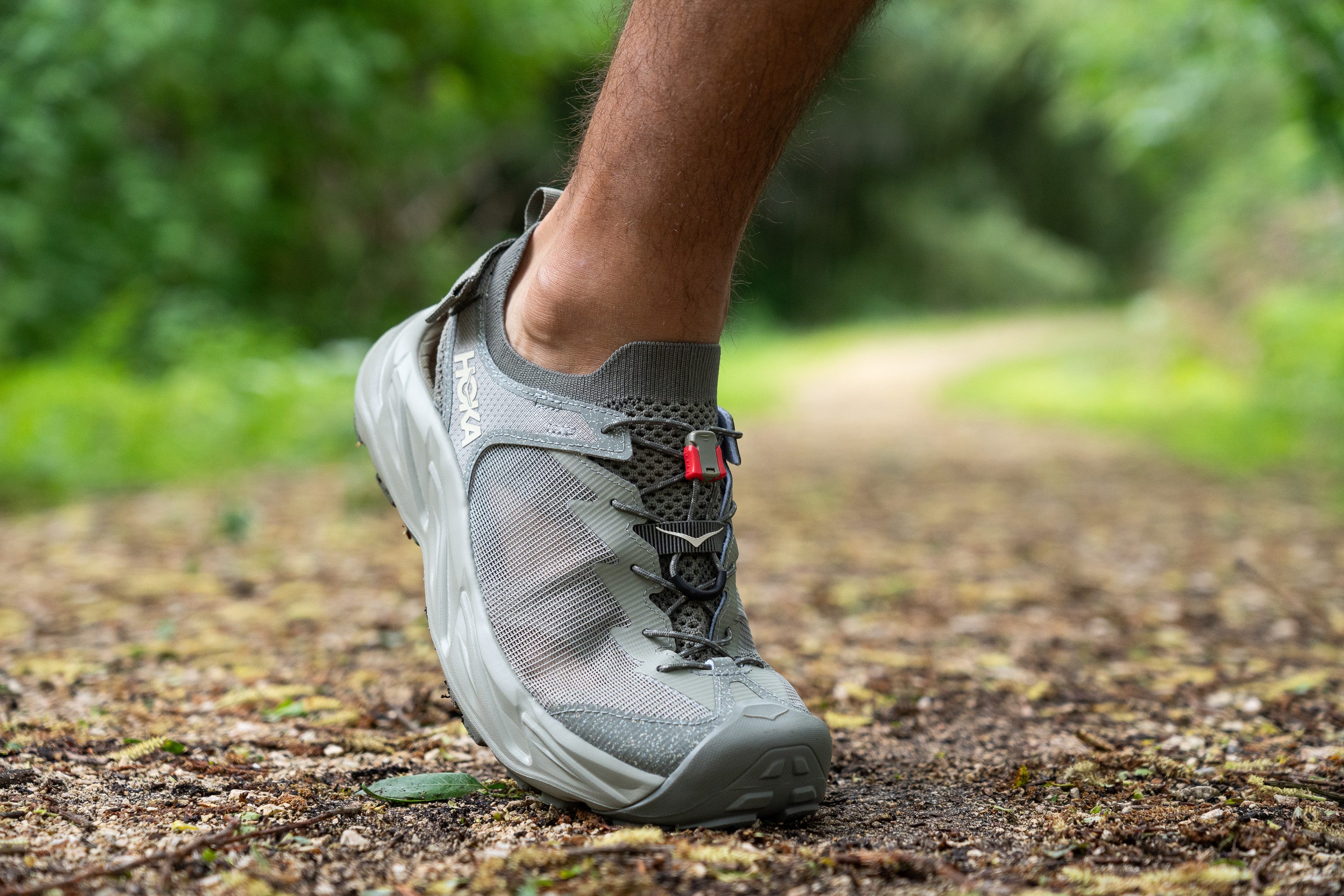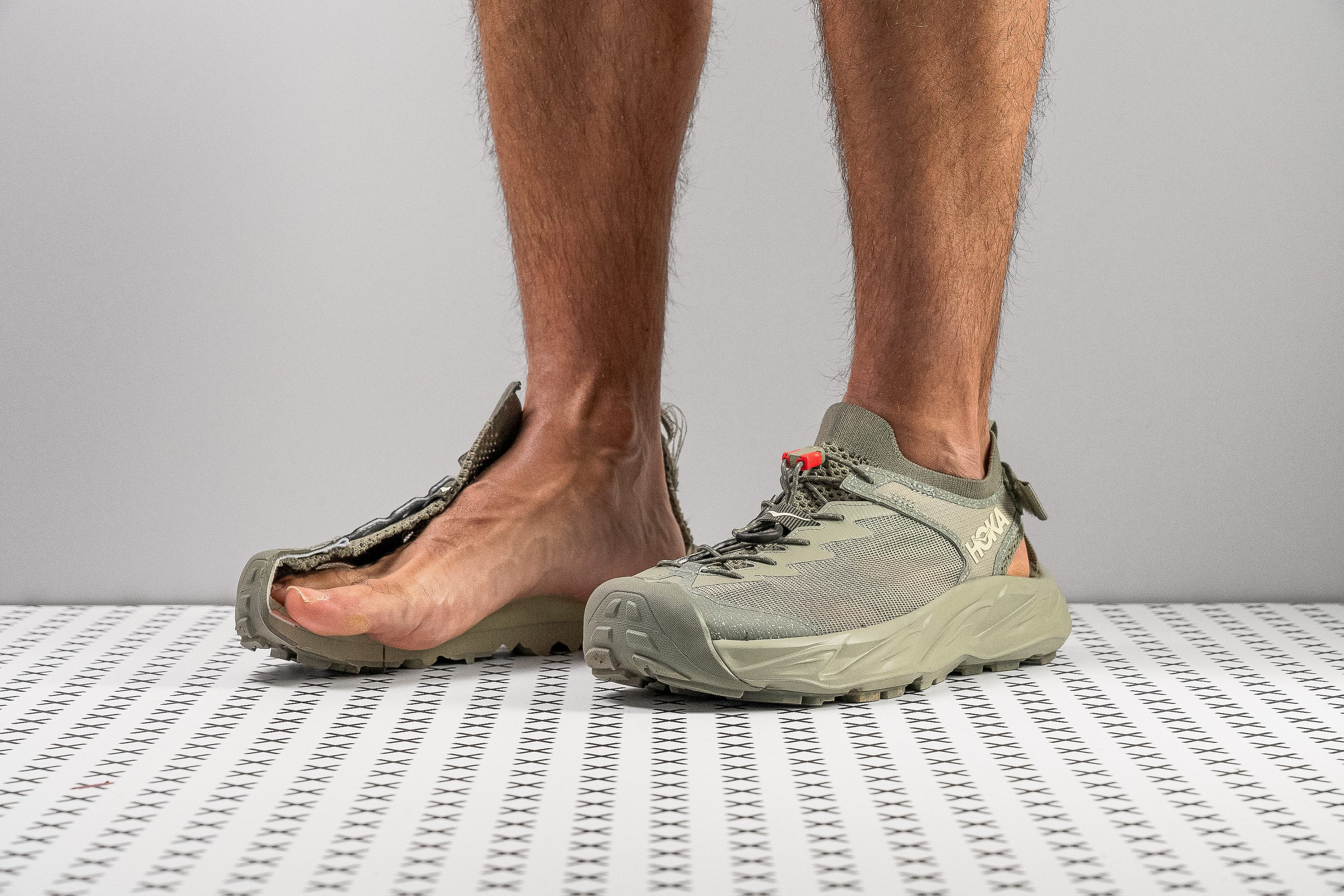Our verdict
- Top pick in best hiking sandals
- Top pick in best water hiking sandals
Pros
- Comfortable cushioning
- Highly durable construction
- Light for a closed-toe sandal
- Unmatched cushioning and impact protection
- Feels stable and grounded
- Fantastic grip on slippery surfaces
- Plenty of toe room
- Sustainable materials
Cons
- Traps sand easily
- Not for narrow feet
- Color discrepancy
Audience verdict
- Top 28% most popular hiking sandals
Comparison
The most similar hiking sandals compared
+ + Add a shoe | |||||
|---|---|---|---|---|---|
| Audience score | 82 Good! | 78 Decent! | 89 Superb! | 89 Superb! | |
| Price | $135 | $140 | $120 | $130 | |
| Trail terrain | LightModerate | LightModerate | LightModerate | Moderate | |
| Shock absorption | High | Low | Moderate | Moderate | |
| Energy return | Moderate | Moderate | High | Moderate | |
| Weight lab Weight brand | 11.6 oz / 329g 12.9 oz / 365g | 11.3 oz / 319g 11.5 oz / 325g | 14.6 oz / 414g 15.2 oz / 431g | 13.4 oz / 381g 14.2 oz / 403g | |
| Use | Day HikingLight HikingMulti-sportWater hiking | Day HikingLight HikingMulti-sportUrban hikingWater hiking | Light HikingWater hiking | Day HikingMulti-sportWater hiking | |
| Construction | Closed toe | Closed toe | Closed toe | Closed toe | |
| Drop lab | 3.2 mm | 8.7 mm | 9.3 mm | 11.0 mm | |
| Size | True to size | True to size | True to size | Slightly small | |
| Midsole softness | Firm | Firm | Balanced | Balanced | |
| Stiffness | Moderate | Flexible | Stiff | Stiff | |
| Outsole hardness | Average | Average | Average | Hard | |
| Outsole durability | Good | Decent | Good | - | |
| Outsole thickness | Average | Thick | Average | Average | |
| Lug depth | 3.0 mm | 3.3 mm | 3.1 mm | 4.1 mm | |
| Heel stack lab | 26.2 mm | 23.8 mm | 27.0 mm | 29.4 mm | |
| Forefoot | 23.0 mm | 15.1 mm | 17.7 mm | 18.4 mm | |
| Heel tab | Finger loop | Finger loop | Finger loop | Finger loop | |
| Midsole width - forefoot | Wide | Very narrow | Average | Average | |
| Midsole width - heel | Very wide | Average | Average | Average | |
| Widths available | Normal | Normal | NormalWide | NormalWide | |
| Ranking | #8 Bottom 27% | #11 Bottom 1% | #2 Top 19% | #5 Top 46% | |
| Popularity | #3 Top 28% | #4 Top 37% | #6 Bottom 45% | #1 Top 10% |
Who should buy
We think that the Hoka Hopara 2 can make an excellent choice for people who need an all-purpose sandal for the following:
- hiking by the water (with wet rocks, roots, and moss involved)
- casual hikes on light-to-moderate trails
- going on a cruise
- gardening and other house chores
- chilling and recovering outdoors
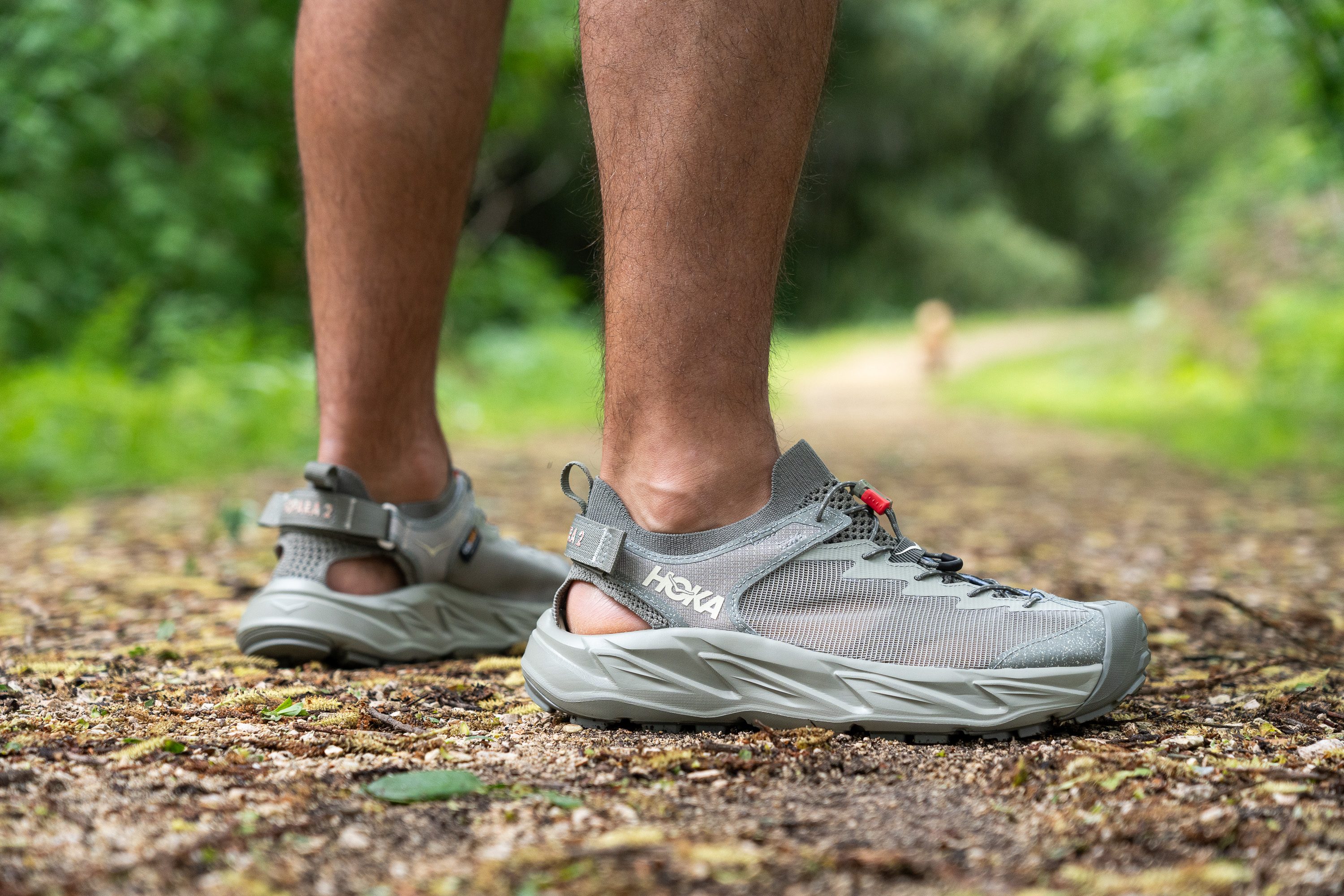
Who should NOT buy
If you are in search of a go-to beach sandal, the Hopara 2 won't make the best option because of its sand-trapping issues. Better opt for the Chaco Z/Cloud or the Teva Hurricane XLT2.
A person with narrow feet will also end up swimming in the Hoka Hopara 2's roomy upper. They may want to choose the aforementioned sandals with adjustable forefoot straps or go for a slimmer hiking shoe instead.
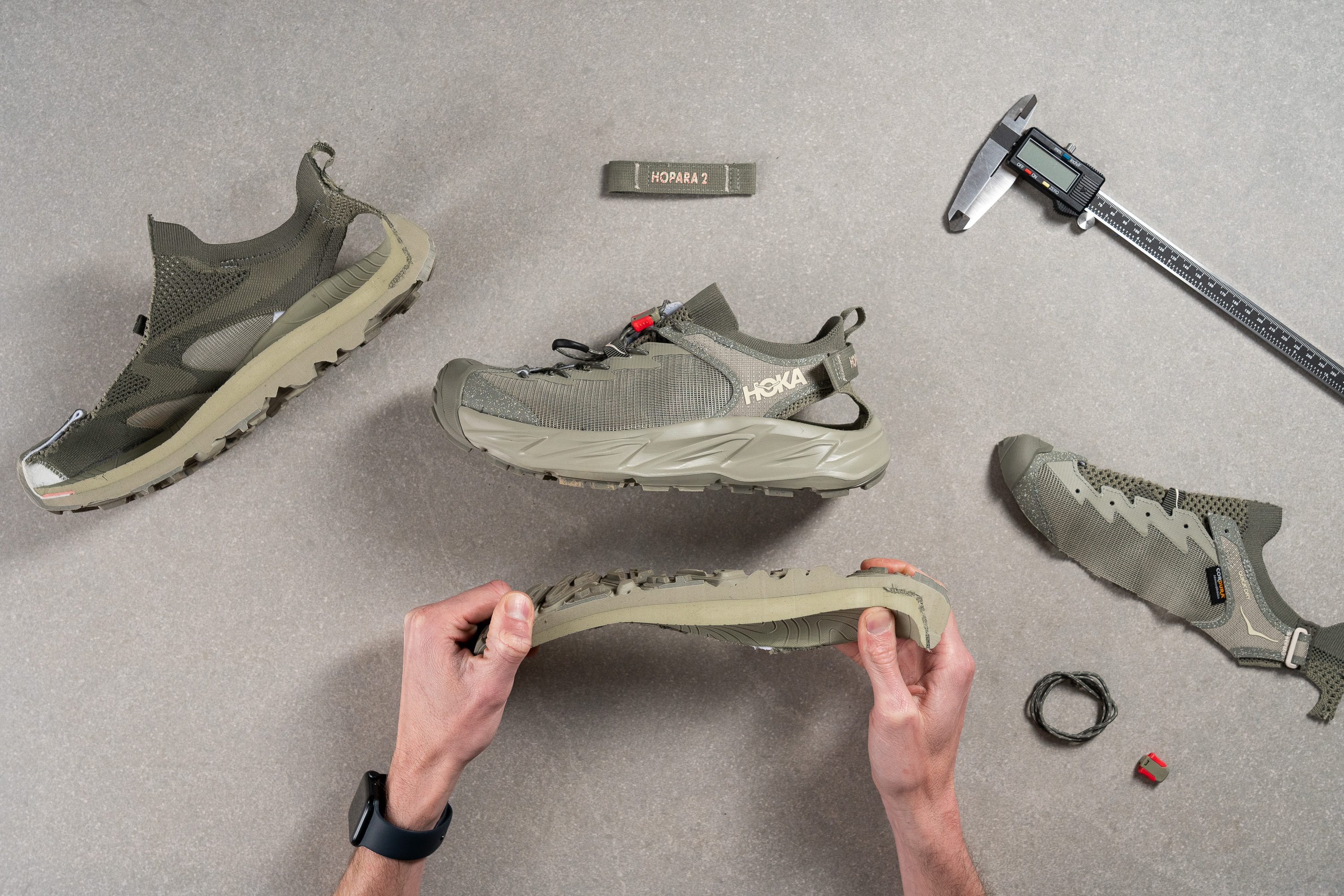
Cushioning
Shock absorption
When you first see the Hopara 2, you might think that it has a monstrous amount of cushioning. And you won't be wrong.
Our high shock absorption measurement of 123 SA in the heel confirmed that this Hoka sandal is even more abundantly cushioned than some hiking shoes! It felt immensely comfortable, reducing stress on our feet and joints, and muted out rocks and other trail debris very well.
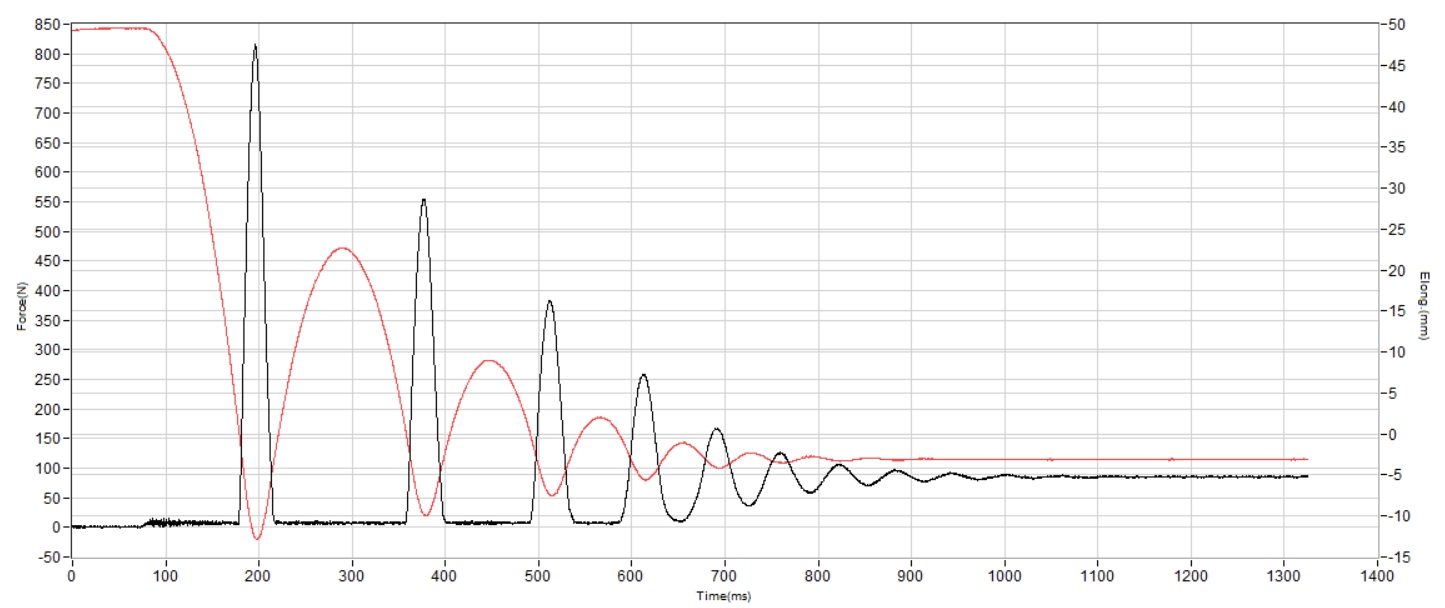
| Hoka Hopara 2 | 123 SA |
| Average | 110 SA |
Energy return
The Hoka Hopara 2 also proved to be moderately responsive with an energy return of 52.1%. This gave us a touch of rebound underfoot, making the ride fairly dynamic and smooth.
| Hoka Hopara 2 | 52.1% |
| Average | 55.3% |
Heel stack
To our great surprise, the Hopara 2 is not as high-stacked as it might seem!
With a heel stack height of 26.2 mm, this Hoka sandal is actually 4.7 mm lower than the Teva Hurricane XLT2 (30.9 mm)!
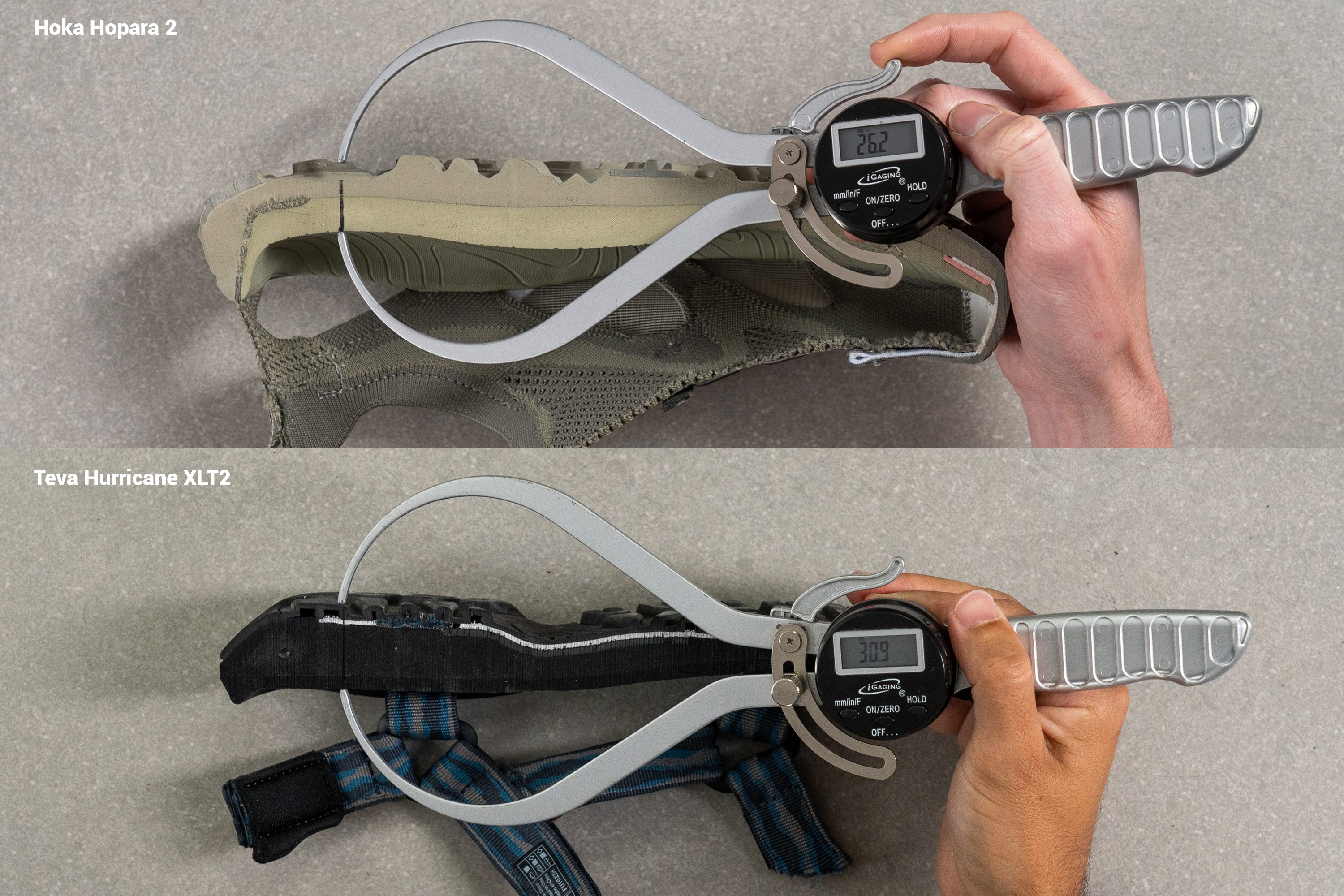
The Hopara 2's midsole appears bigger than it is because of its boat-like shape. It has tall sidewalls but the middle portion is cradled so the foot ends up sitting inside the midsole and not on top of it.
| Hoka Hopara 2 | 26.2 mm |
| Average | 26.3 mm |
Forefoot stack
However, its abundant cushioning in the ball of the foot area explains why this Hoka feels so much cushier than the average sandal.
Measuring the Hopara 2's forefoot stack height, we got 23.0 mm which is about 5 mm thicker than average! We felt safe tiptoeing our way on rocky shores and rooty paths.
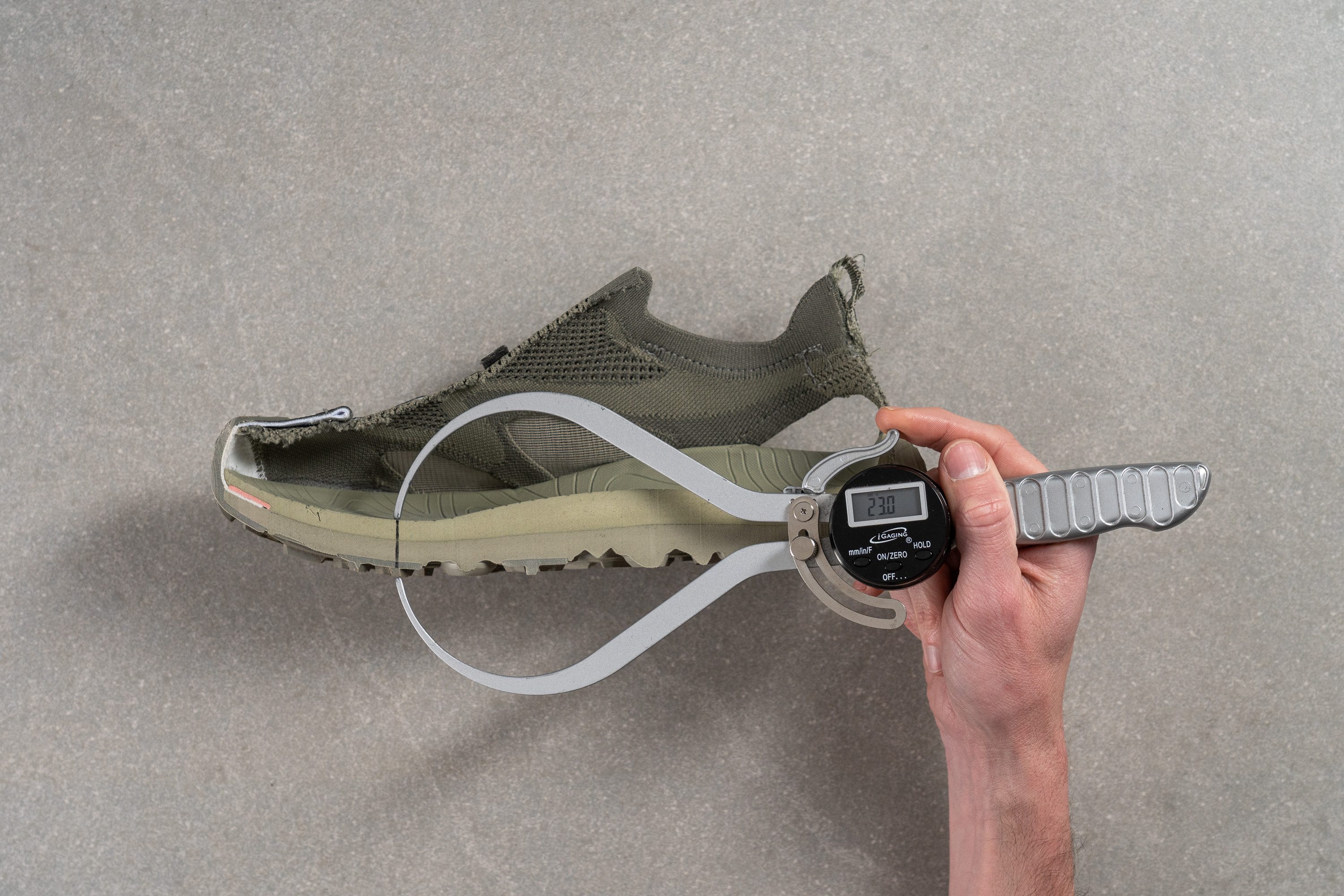
| Hoka Hopara 2 | 23.0 mm |
| Average | 18.5 mm |
Drop
One of the hidden tricks that help the Hopara 2 feel well-cushioned but stable (aside from the cradled midsole), is a low heel-to-toe offset.
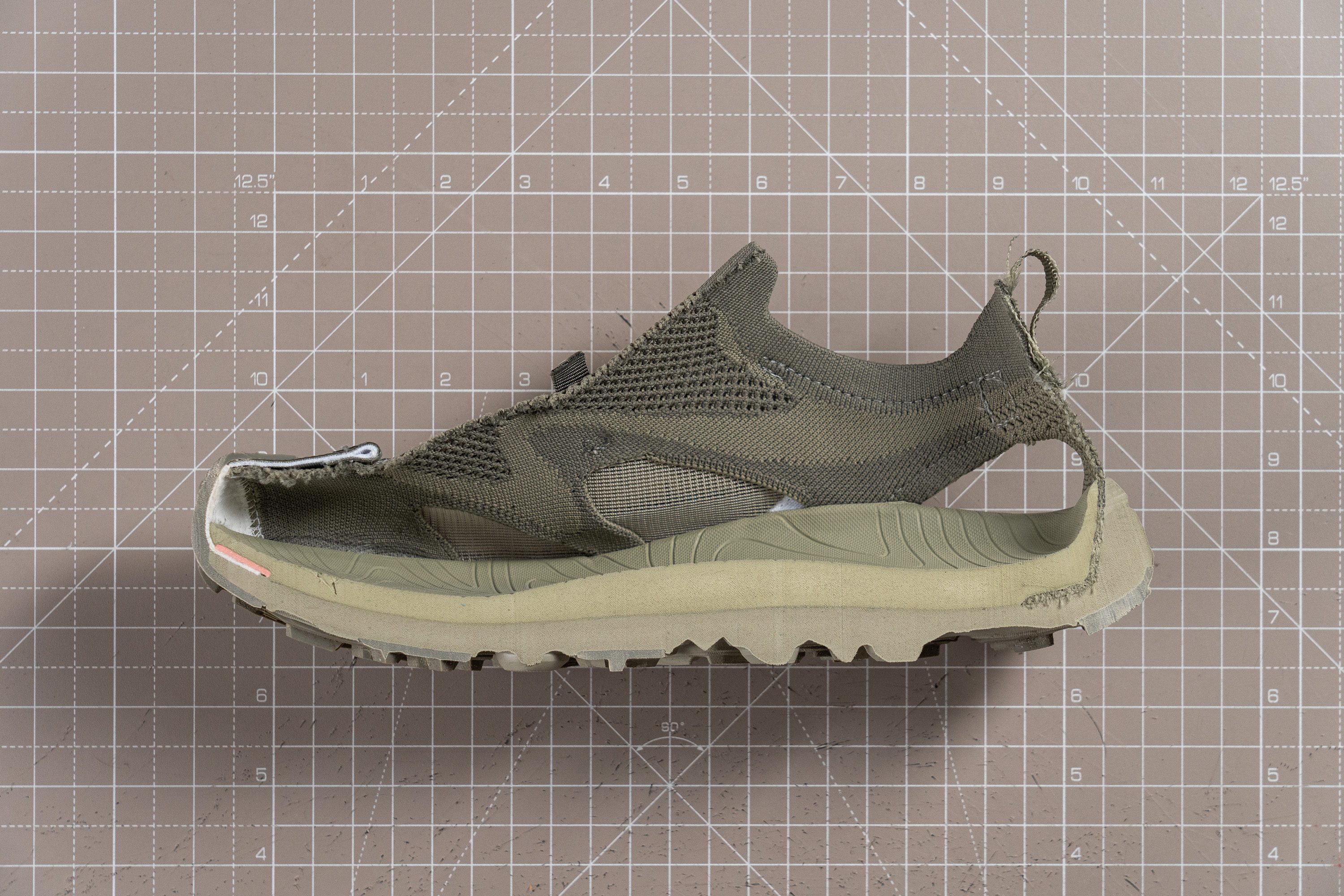
According to the brand's official stats, the drop should be at 6.0 mm. However, we found that it is even lower than that - 3.2 mm!
Having our heels nearly level with the toes definitely helped us feel more grounded and surefooted while still reaping the benefits of great cushioning.
| Hoka Hopara 2 | 3.2 mm |
| Average | 7.8 mm |
Midsole softness
Having cut the Hoka Hopara 2 in half, we found that its midsole is made of two foams - a softer one on top and a firmer one at the bottom.
Together they create a nice balance of step-in comfort and confidence underfoot.
The video above mostly shows the firmer foam in action. Pressing our Shore A durometer against it returned 33.5 HA which is indeed 20% firmer than the average sandal foam.
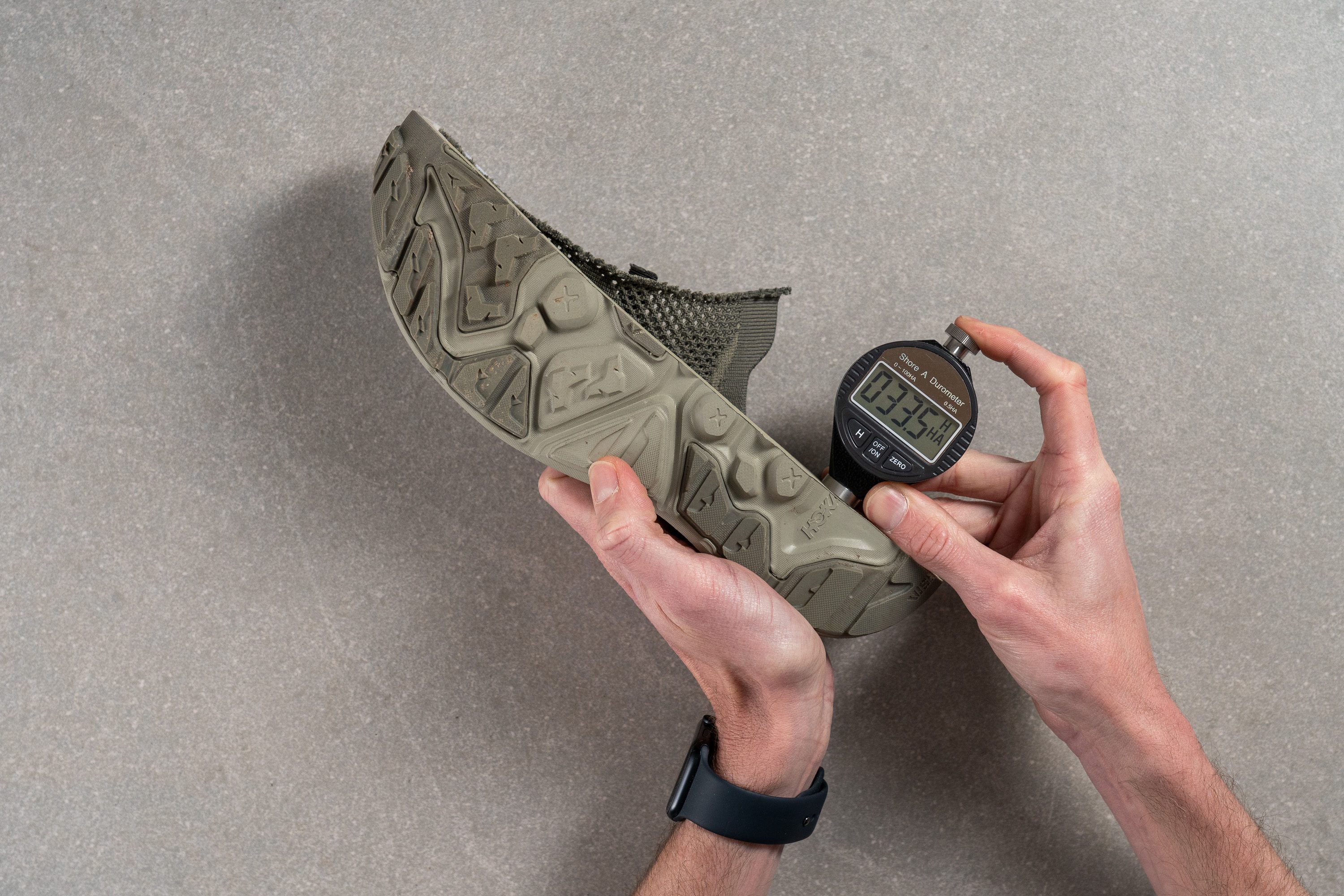
This layer is responsible for protecting the foot as well as extending the Hopara 2's lifespan.
| Hoka Hopara 2 | 33.5 HA |
| Average | 26.1 HA |
Secondary foam
Now to the fun part.
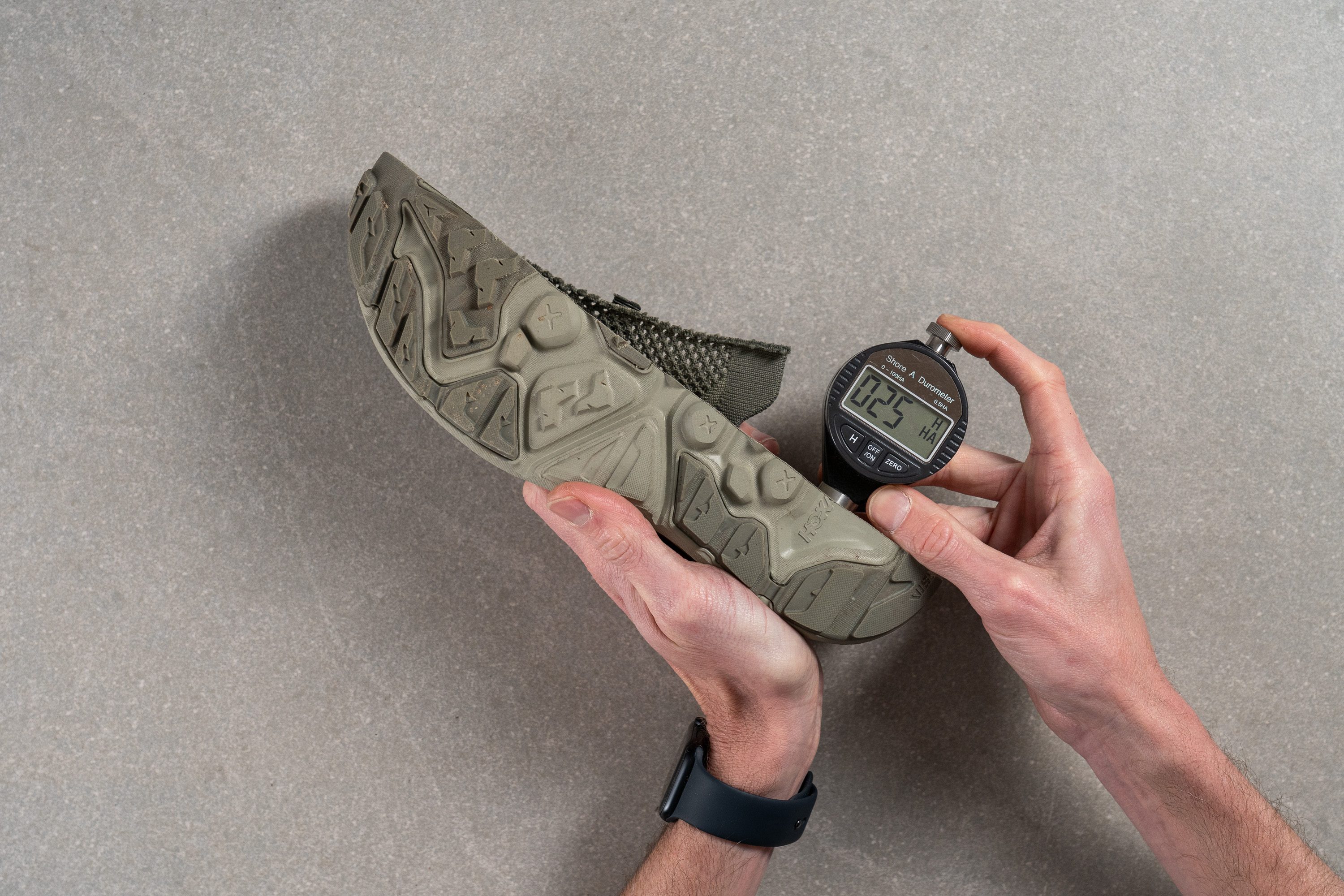
We measured the softer layer of the Hopara 2 at 24.0 HA. This is a good 40% plusher than the bottom foam!
It felt pleasantly soft and even a little bouncy - the perfect combo for all-day comfort! We can wholeheartedly recommend this Hoka sandal for hours of walking and standing.
| Hoka Hopara 2 | 24.0 HA |
| Average | 21.9 HA |
Size and fit
Size
Hoka Hopara 2 fits true to size (57 votes).
Internal length
| Hoka Hopara 2 | 259.1 mm |
| Average | 262.8 mm |
Toebox width - widest part
Trying the Hoka Hopara 2 in our regular US size 9, we found its toebox fit rather spacious. The photo below even makes it seem like the sandal is too big for us.
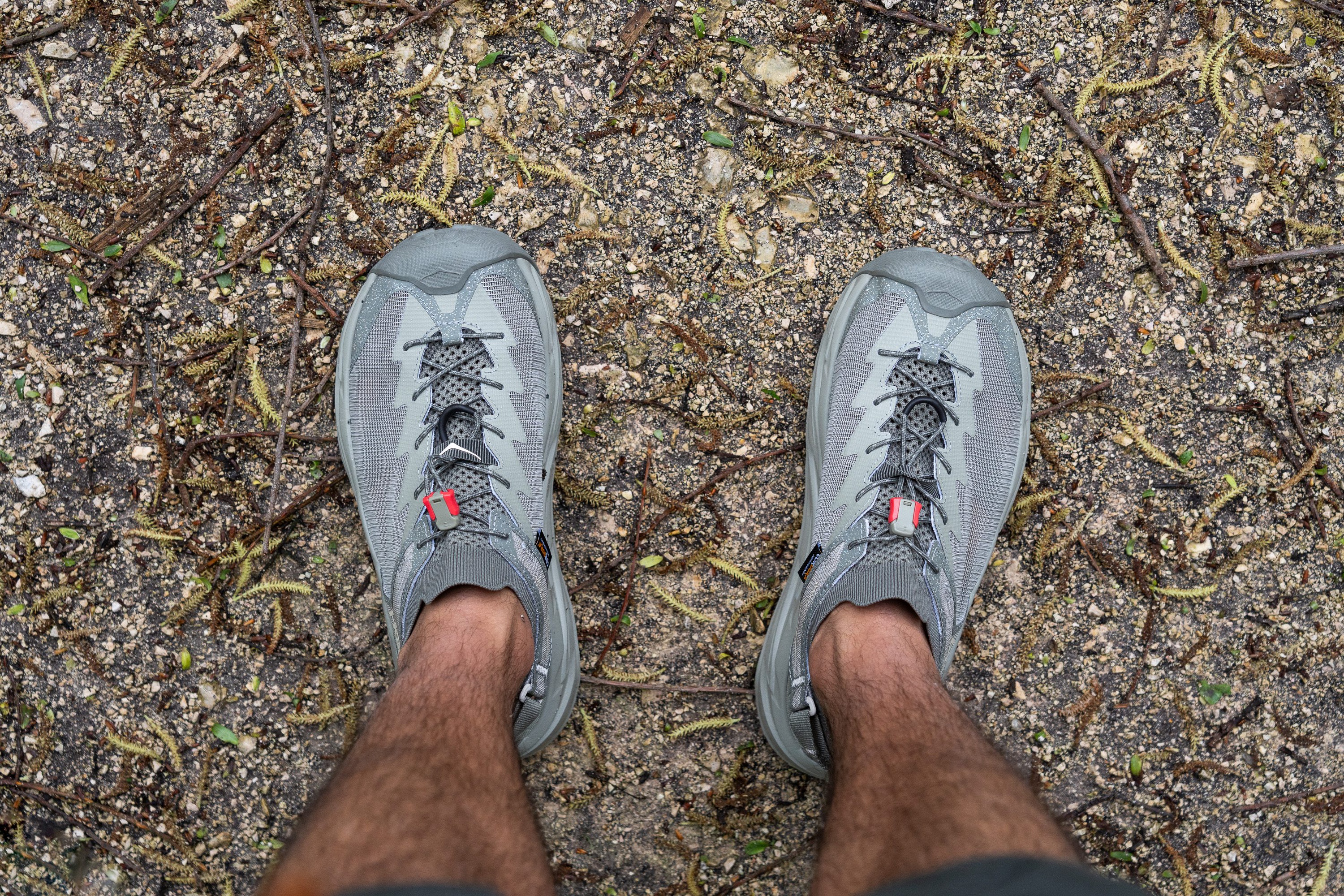
But in our case, it was not critical enough to size down.
Measuring the sandal's forefoot width in the widest part, our caliper showed 104.1 mm. This is indeed a few millimeters wider than average.
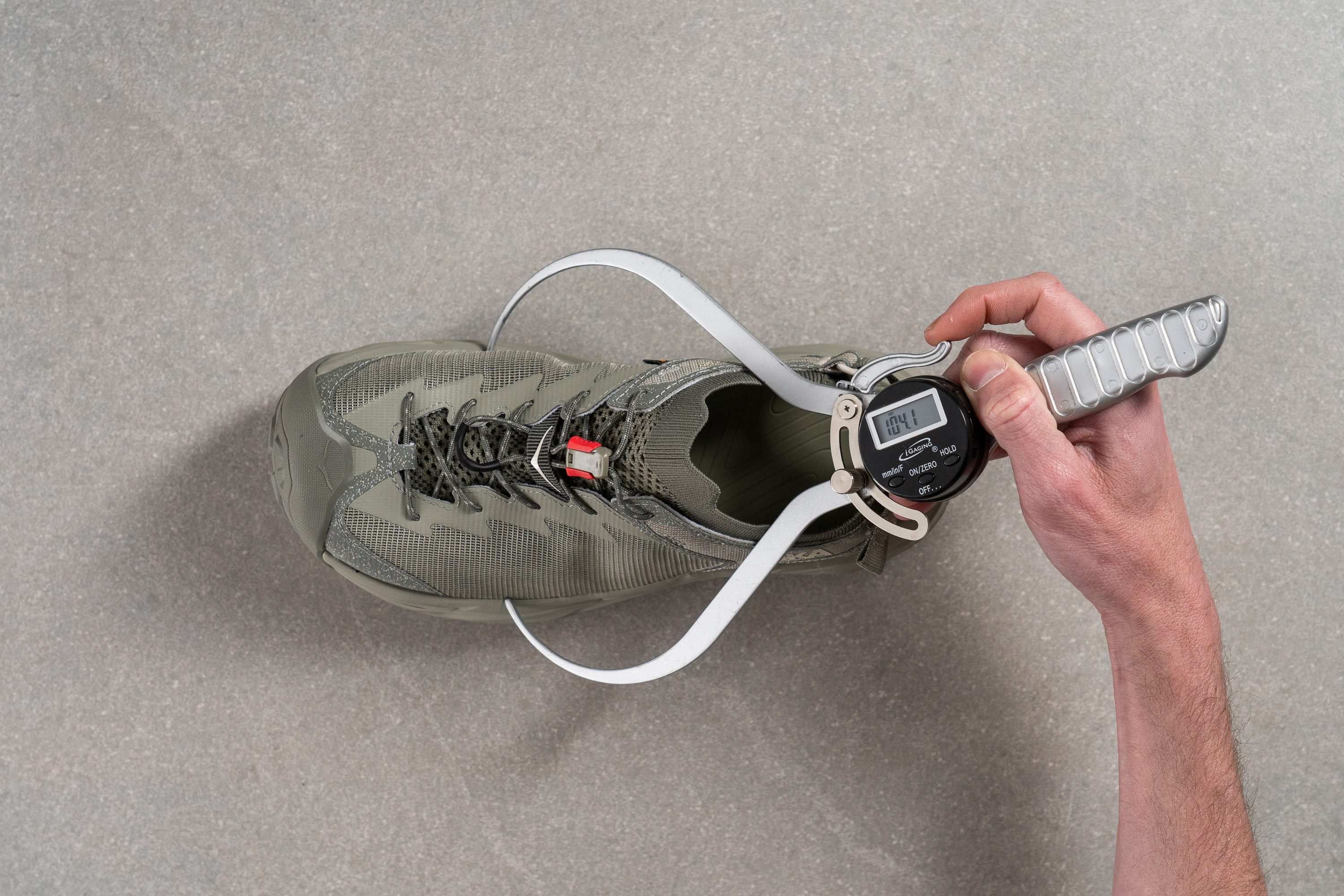
We believe that folks with wider feet will appreciate all that room in the toebox.
This test follows an older methodology, which is why you don't see recently tested shoes in the chart. Results from different methodologies can not be compared.
| Hoka Hopara 2 | 104.1 mm |
| Average | 102.6 mm |
Lockdown
The second iteration of the Hopara sees a couple of design tweaks that help to fine-tune the sandal's fit.
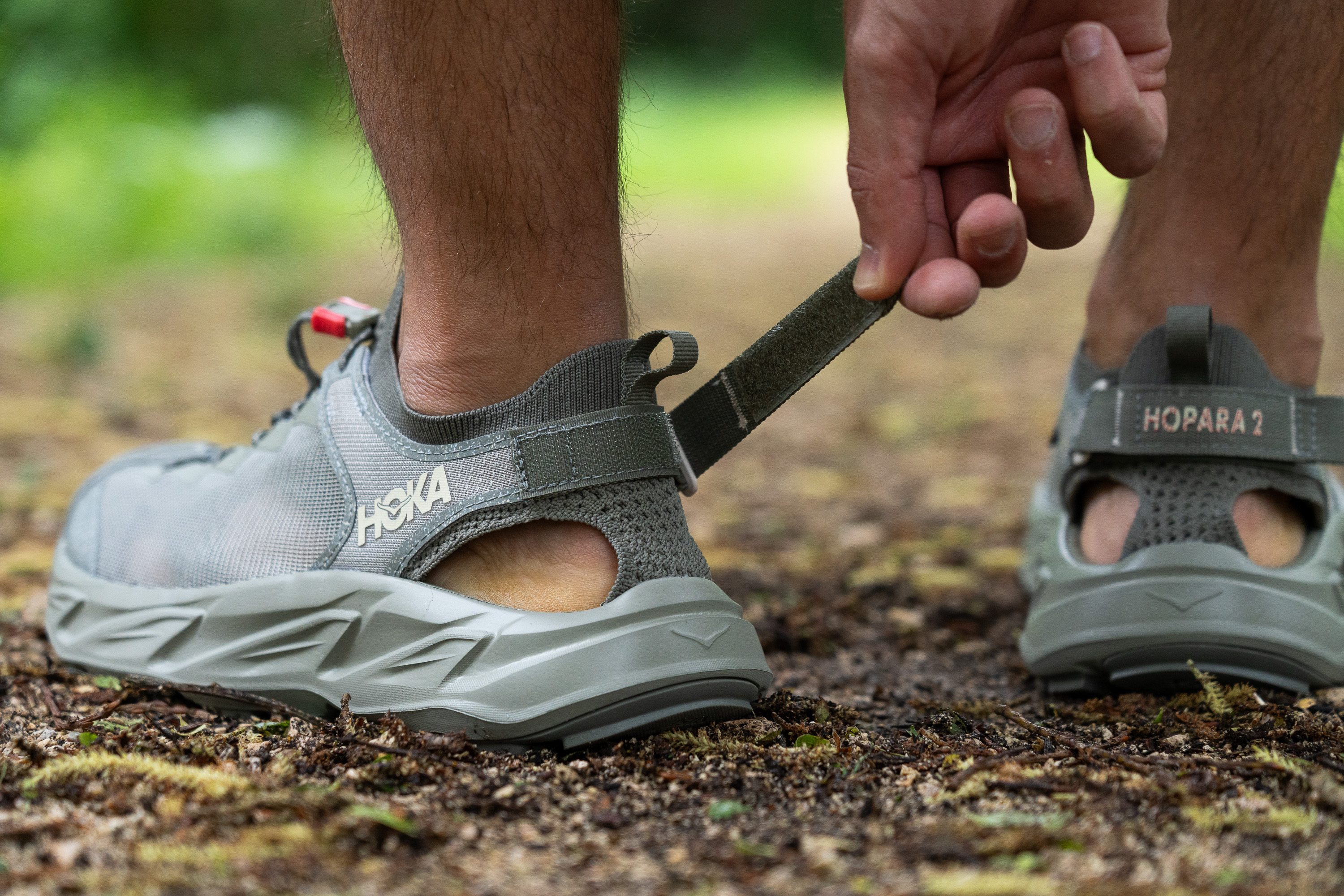
The most notable change would be the adjustable Velcro strap on the heel. Given the added toebox space, some people may find themselves looking for a tighter fit around the ankle and the strap helps to provide it.
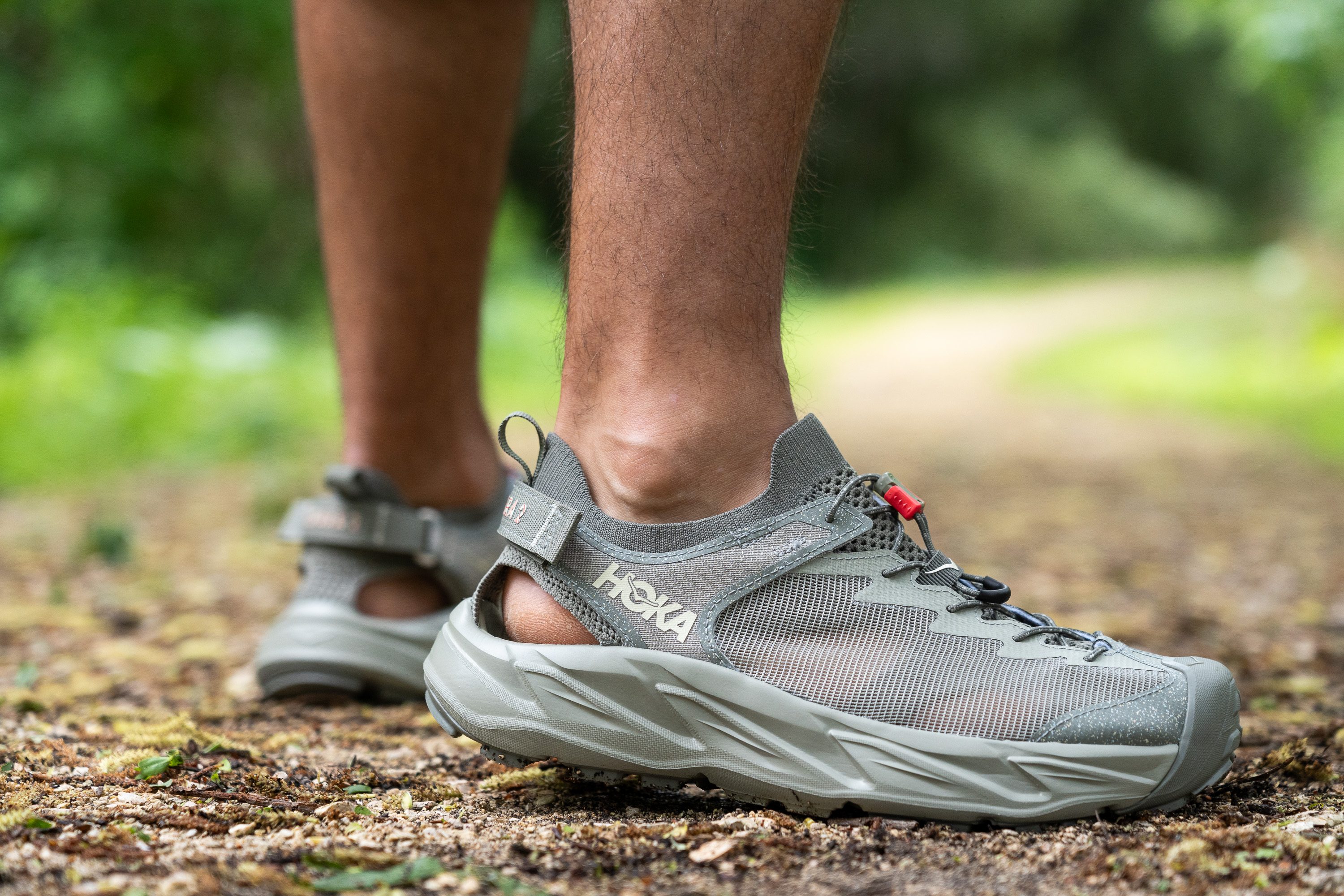
Secondly, the knit collar of the v2 felt more sock-like against our ankles than the neoprene bootie of the v1. Sitting closer to the skin, we also found the knit collar more effective at preventing debris from getting inside.
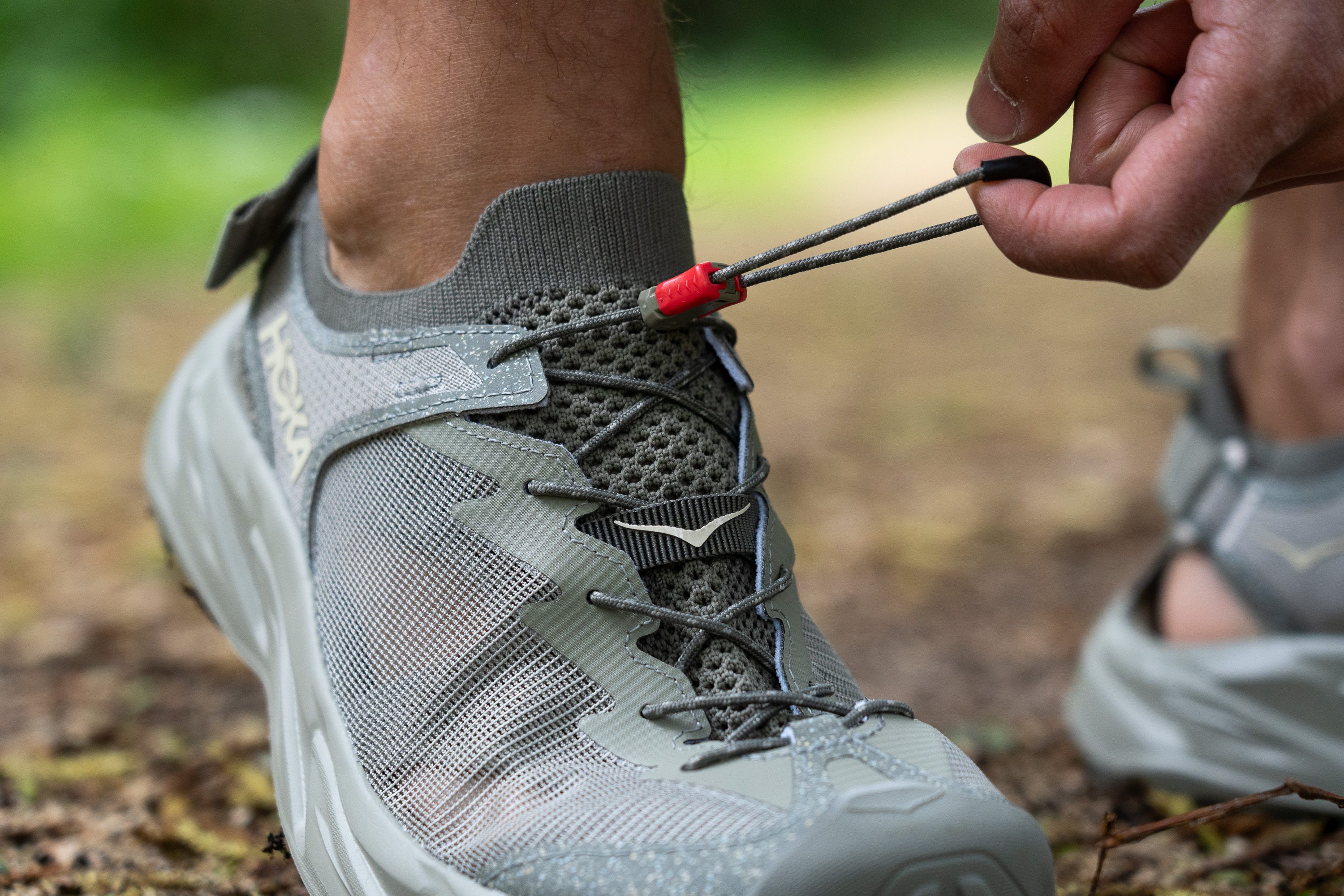
Even the toggle lace received an update. We found it much easier to work with and there is no more extra knob at the end of the laces bumping the top of our insteps.
Traction / Grip
Lug depth
Even though the lug depth of the Hoka Hopara 2 (3.0 mm) doesn't stray far from the average, the sandal kept us surefooted even on wet rocks and grass!
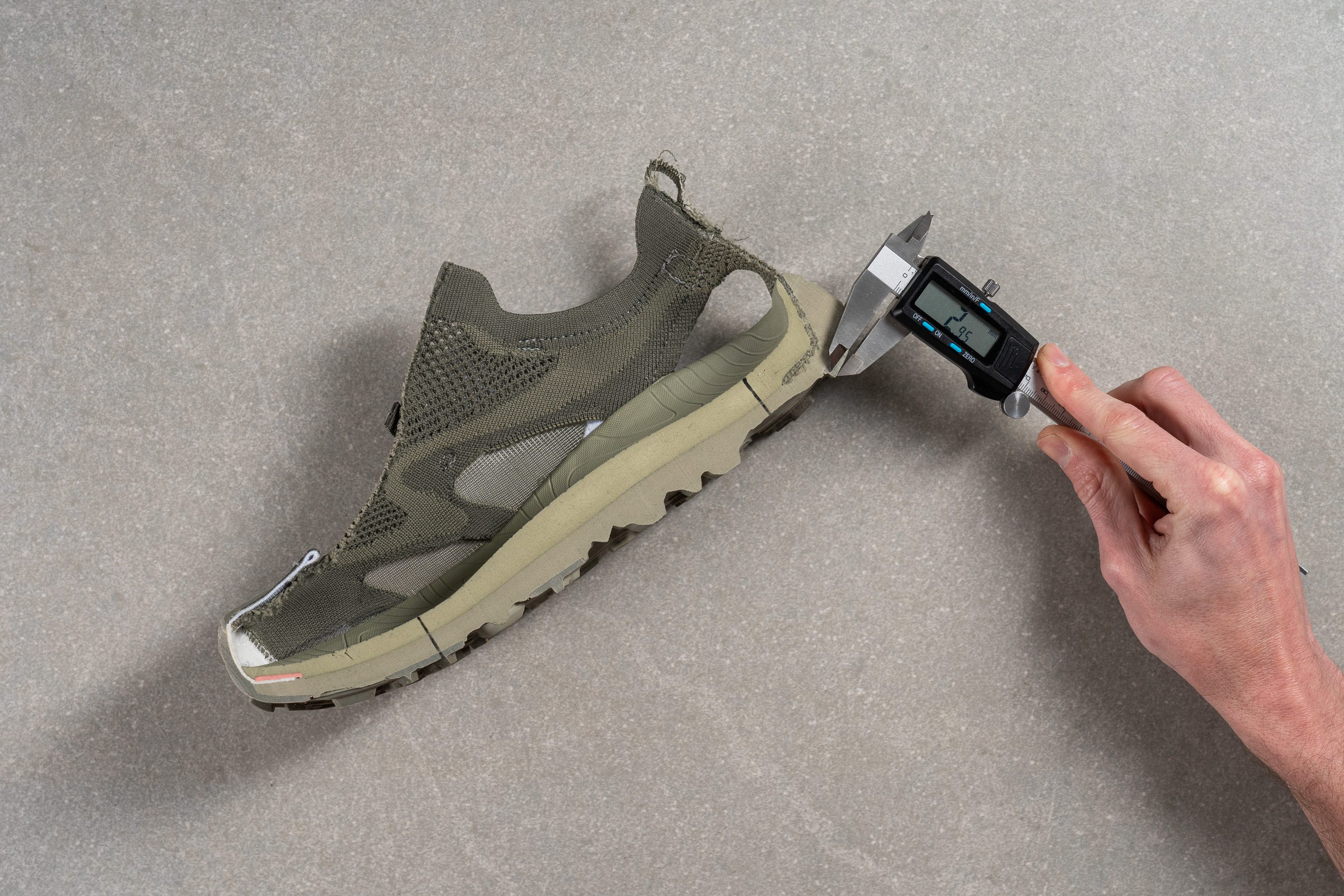
A mix of exposed foam, sticky rubber, and diverse lug shapes and sizes all worked together to create a pretty strong bite in a wide range of situations.
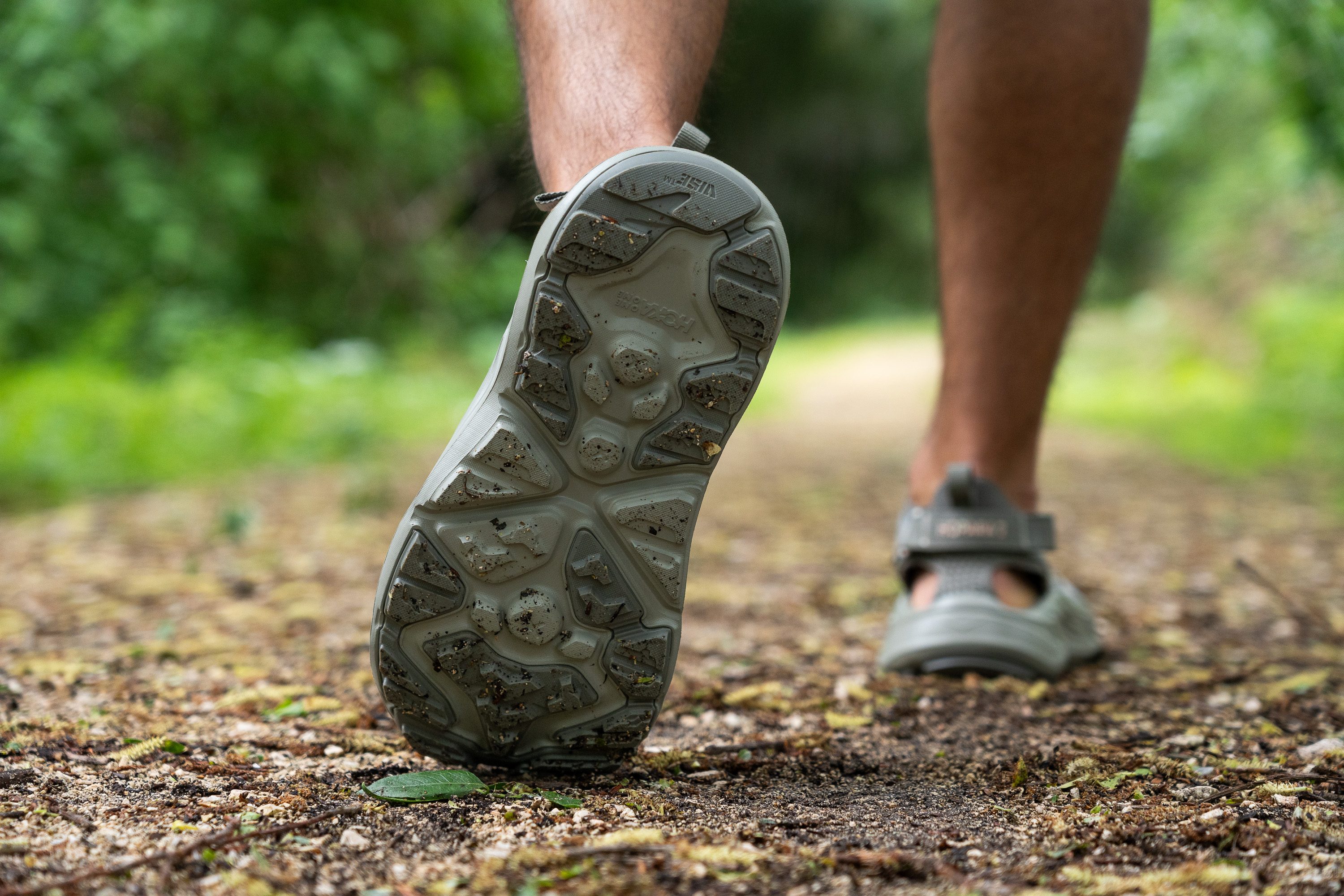
But if you tackle mud and highly technical terrain on a regular basis, we strongly suggest upgrading to a hiking shoe with deeper lugs (at least 4.0 mm).
| Hoka Hopara 2 | 3.0 mm |
| Average | 2.9 mm |
Flexibility / Stiffness
Even though the Hopara 2 makes an impression of a very unforgiving platform, we found that it is not much stiffer than the average sandal.
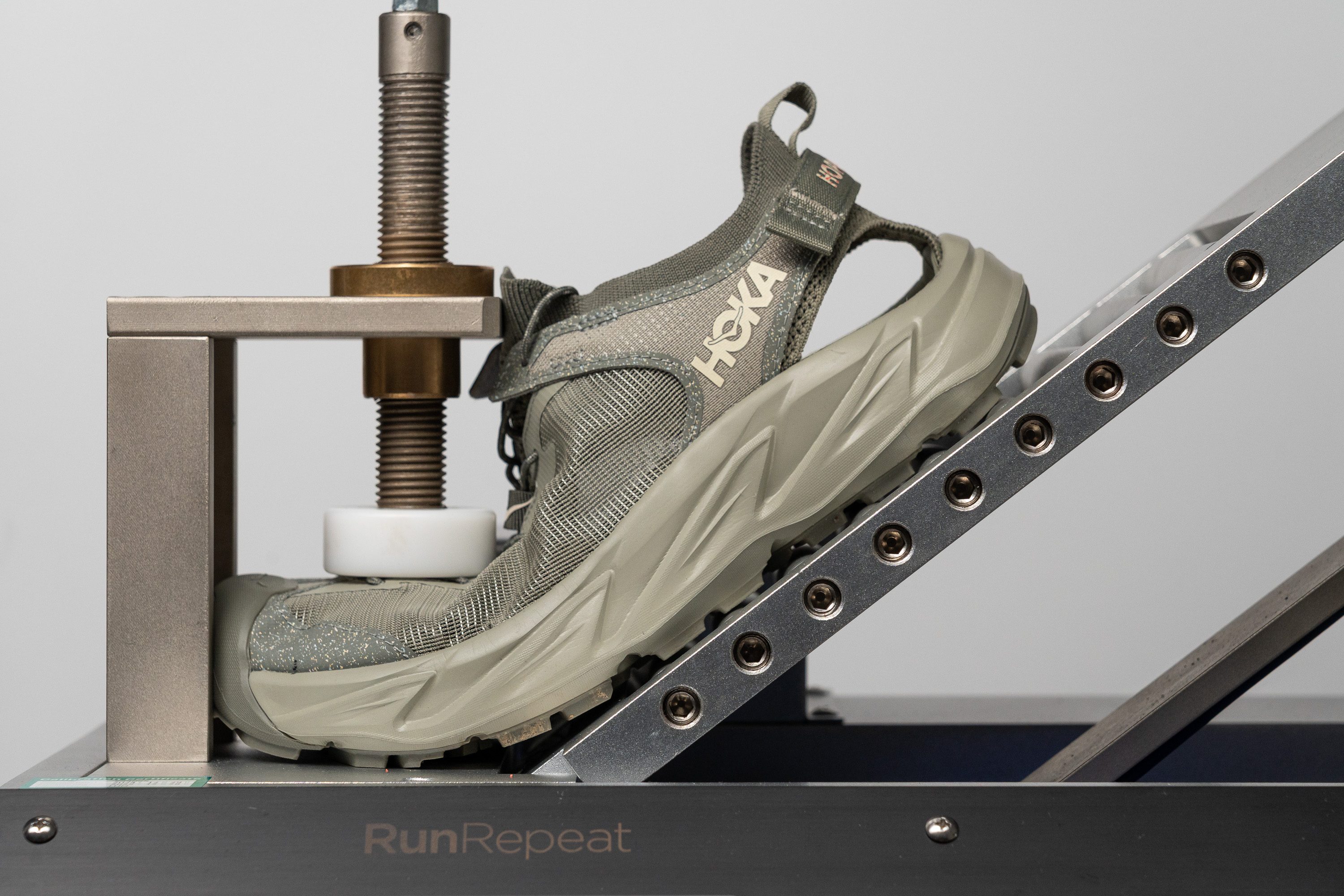
Bending it to a 30-degree angle in our shoe flexing tester, the machine returned a fairly standard reading of 9.7N. This is even less force than it takes to bend a hiking sandal on average.
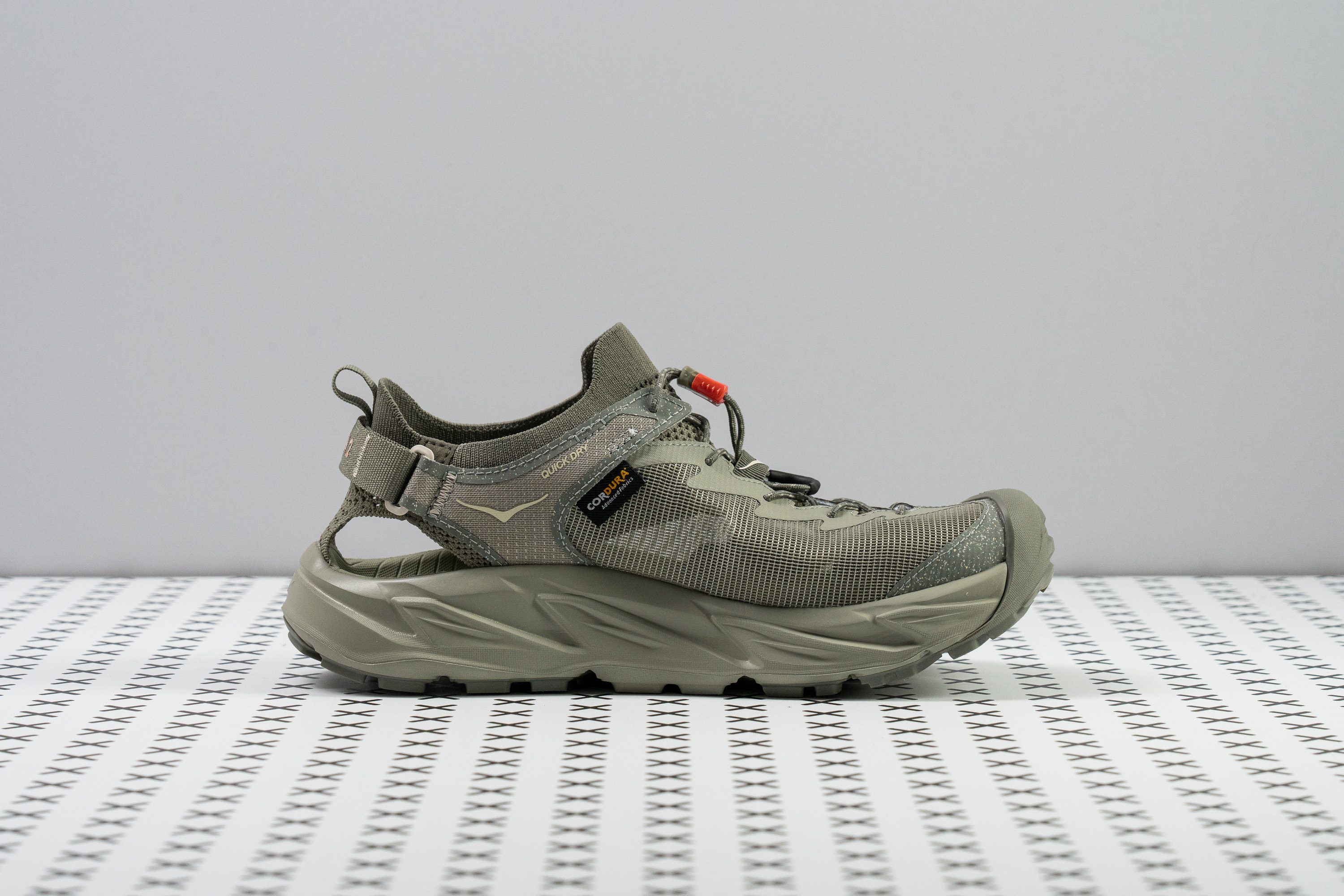
Nevertheless, the heel-to-toe transitions felt marvelously smooth in the Hopara 2. We believe that its rockered sole shape played a key role in that pleasant experience too.
| Hoka Hopara 2 | 9.7N |
| Average | 9.2N |
Weight
We were delighted to discover that the Hopara 2 shaved off a whole ounce of weight!
Putting it on our scale in a men's US size 9 returned 11.6 oz (329g) which is notably lighter than the original Hopara (12.6 oz/357g).
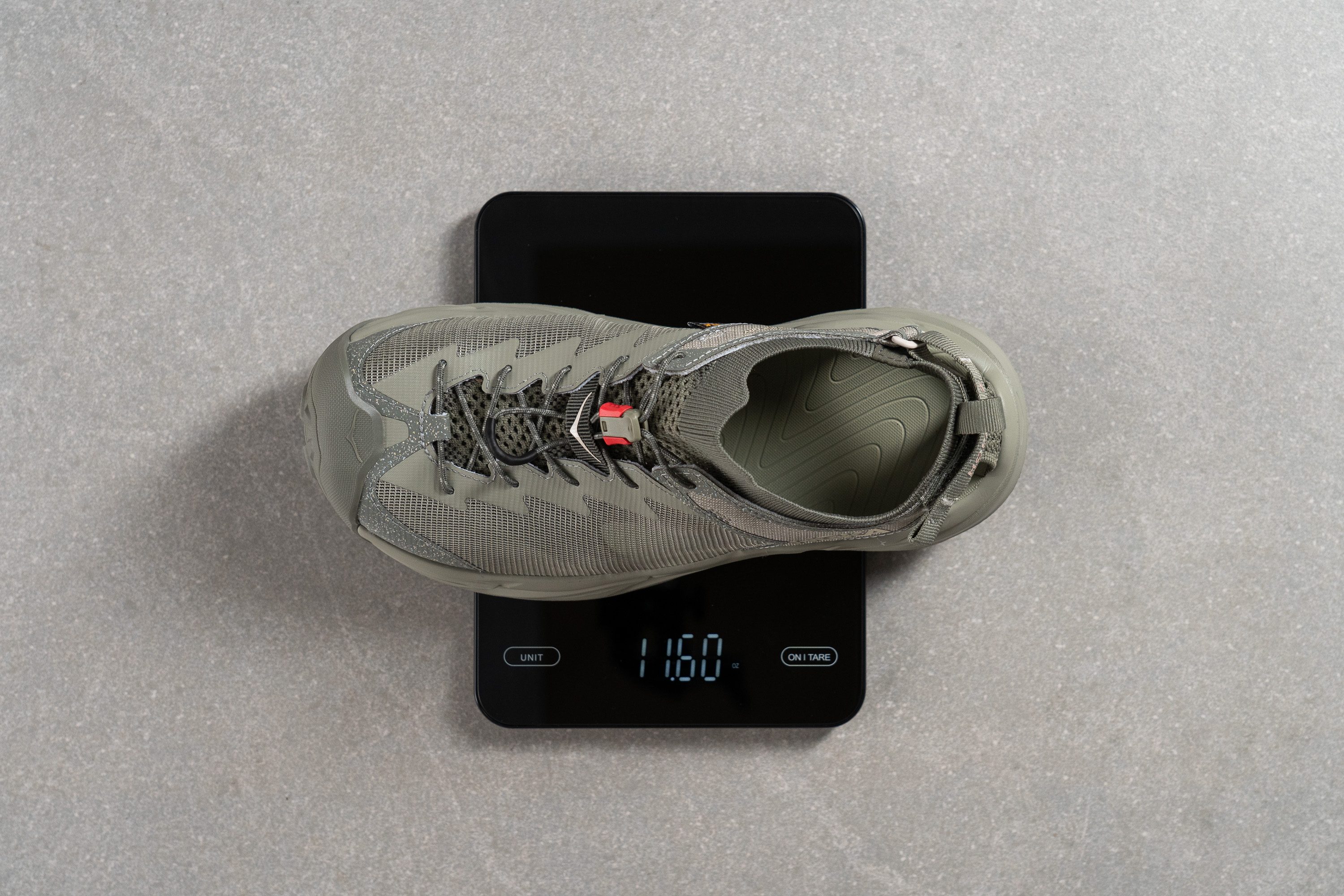
We attribute that to the upper refinement where the ultralight Cordura took the place of thick overlays.
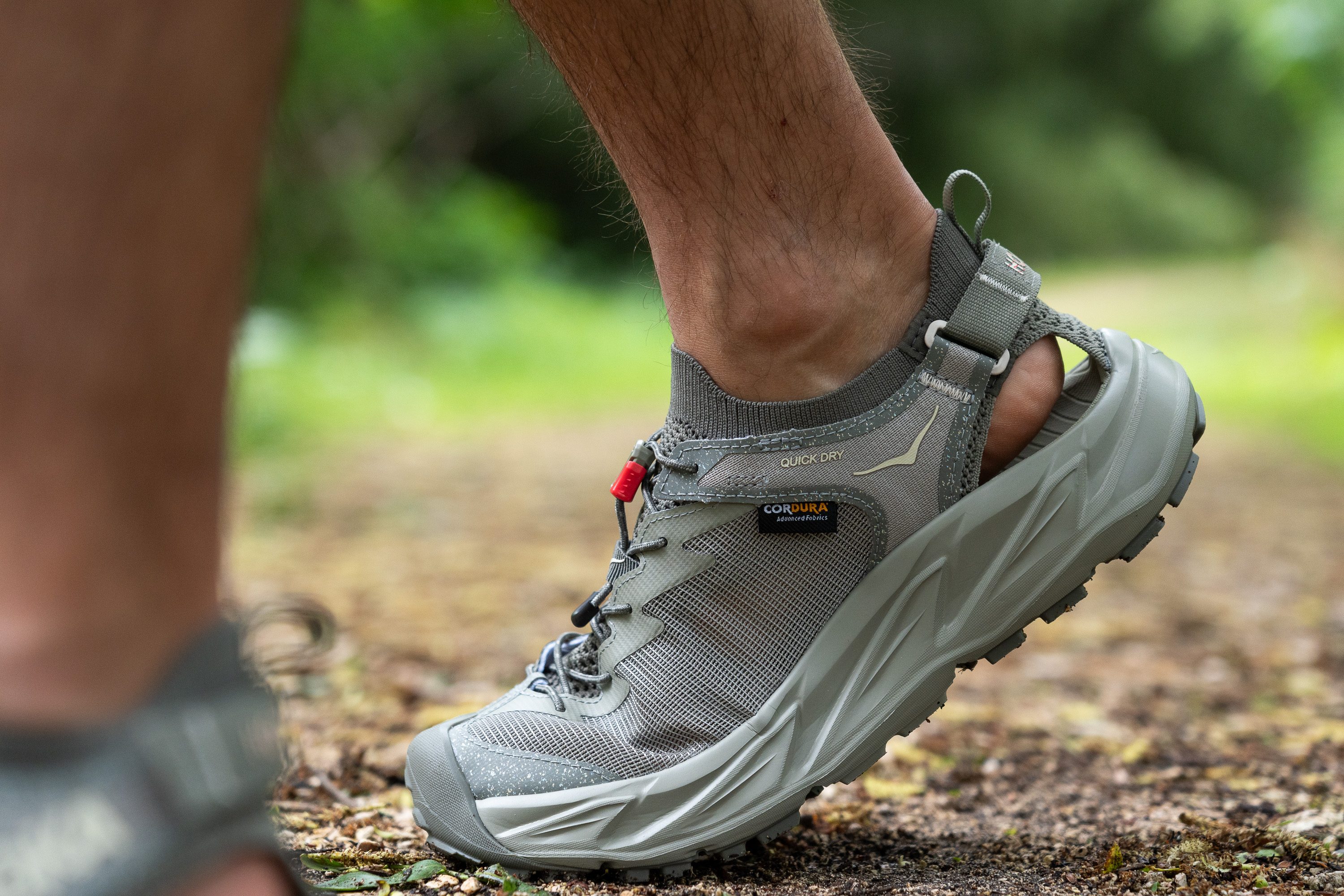
This is by far the lightest option among the closed-toe sandals we've tested!
| Hoka Hopara 2 | 11.6 oz (329g) |
| Average | 11.0 oz (313g) |
Stability
Lateral stability test
Hoka describes the Hopara 2 as a neutral sandal as it doesn't feature any additional components to support the arch or prevent overpronation.
However, based on our own lab tests and experience with the sandal, we wouldn't write it off as incompetent for people with flat feet and pronation issues.
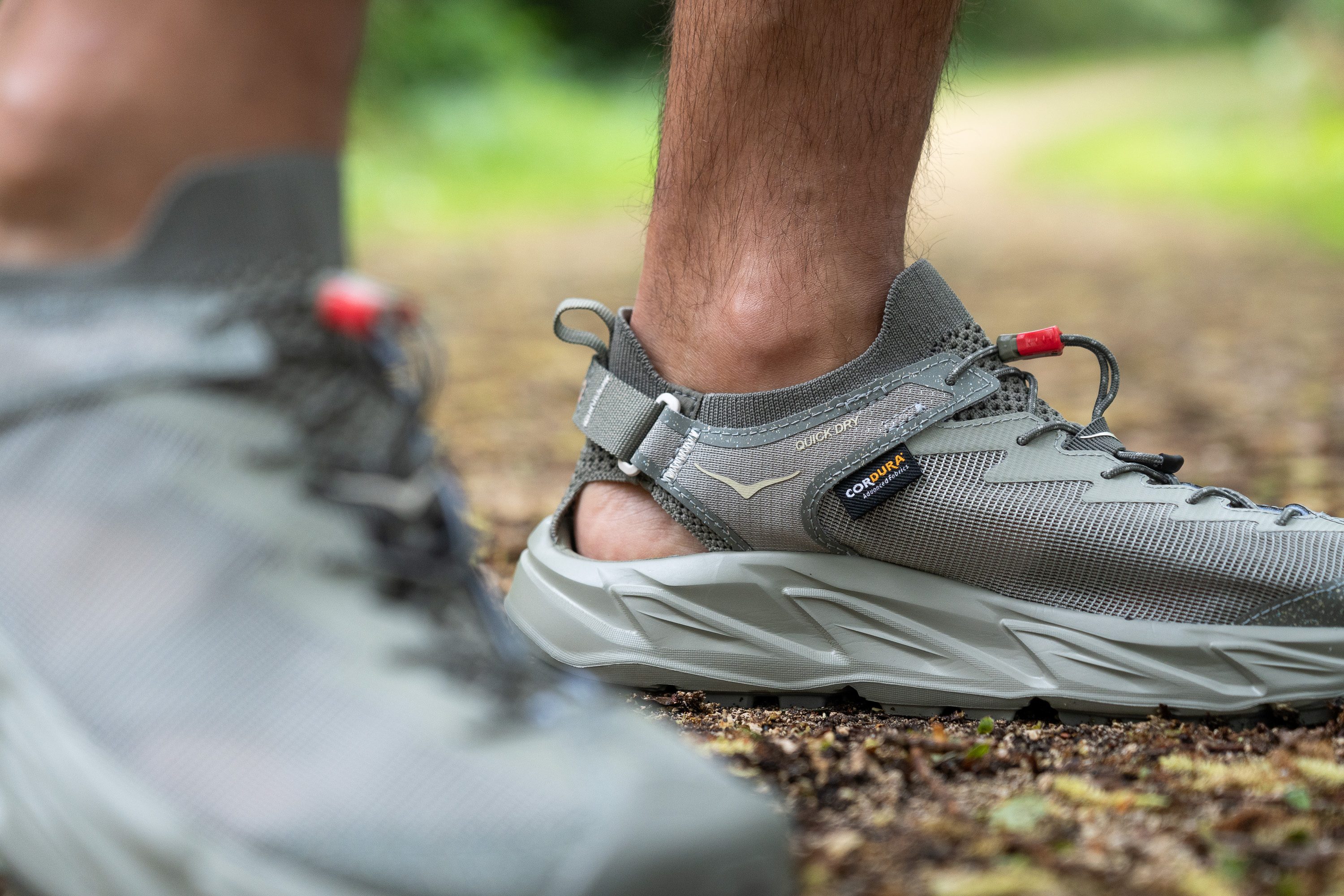
We found that the Hopara 2's construction has a good deal of inherent stability which can benefit those in need of light-to-moderate support.
Torsional rigidity
First of all, let's have a look at the Hopara 2's torsional rigidity. We must say that it's not so easy to twist this sandal!
On a scale from 1 to 5, where 5 is the stiffest, we readily gave it a 3 out of 5. It is notably stiffer than a typical hiking sandal.
| Hoka Hopara 2 | 3 |
| Average | 2.6 |
Midsole width - forefoot
As befits a Hoka shoe, the Hopara 2 beats records when it comes to sole dimensions.
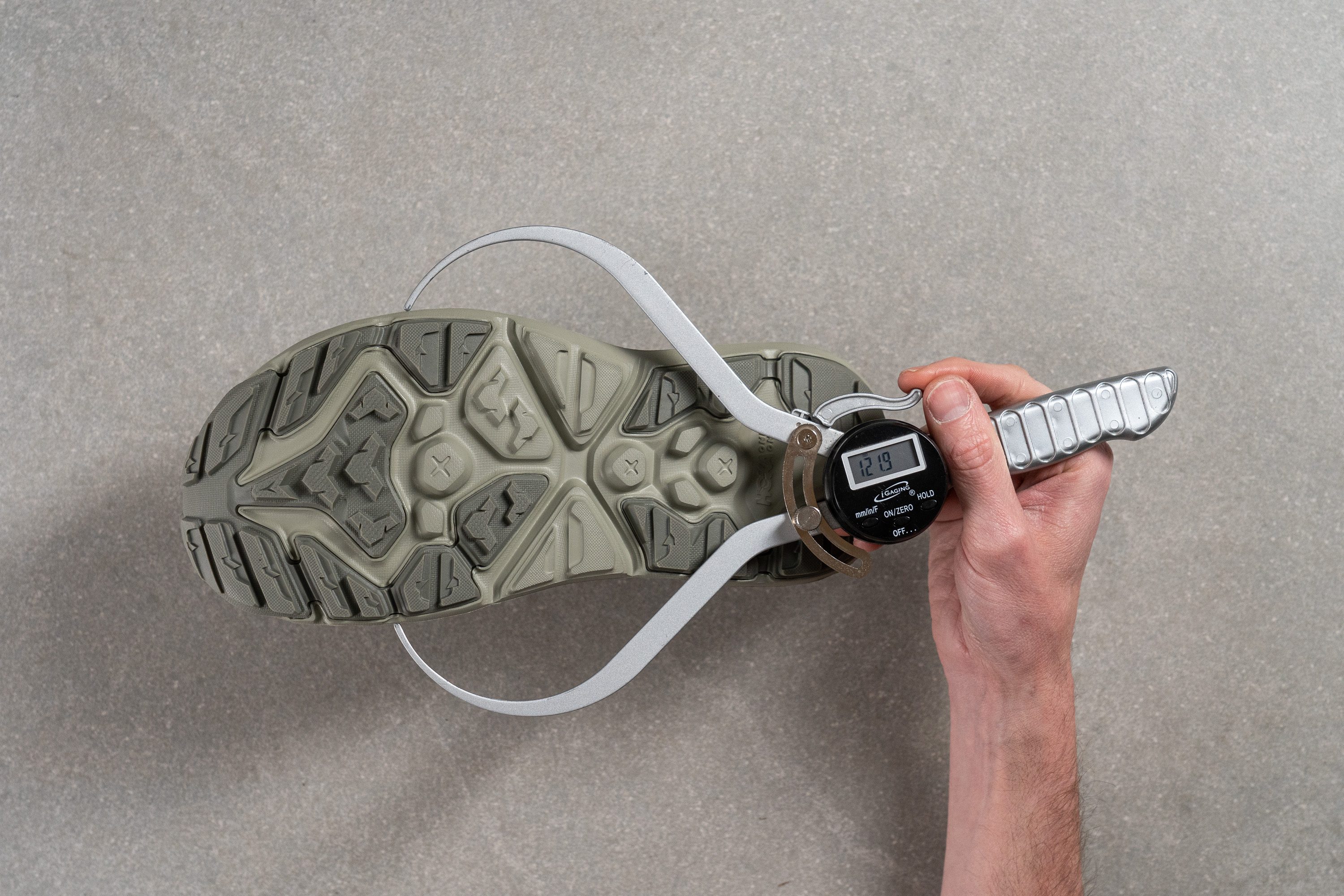
With a caliper measurement of 121.9 mm in the widest part of the forefoot, the sandal confirmed its status as the widest platform among our lab-tested hiking sandals!
It is followed by the KEEN Newport H2 at 121.1 mm.
| Hoka Hopara 2 | 121.9 mm |
| Average | 119.0 mm |
Midsole width - heel
The Hopara 2's heel turns out to be wider than the industry average too.
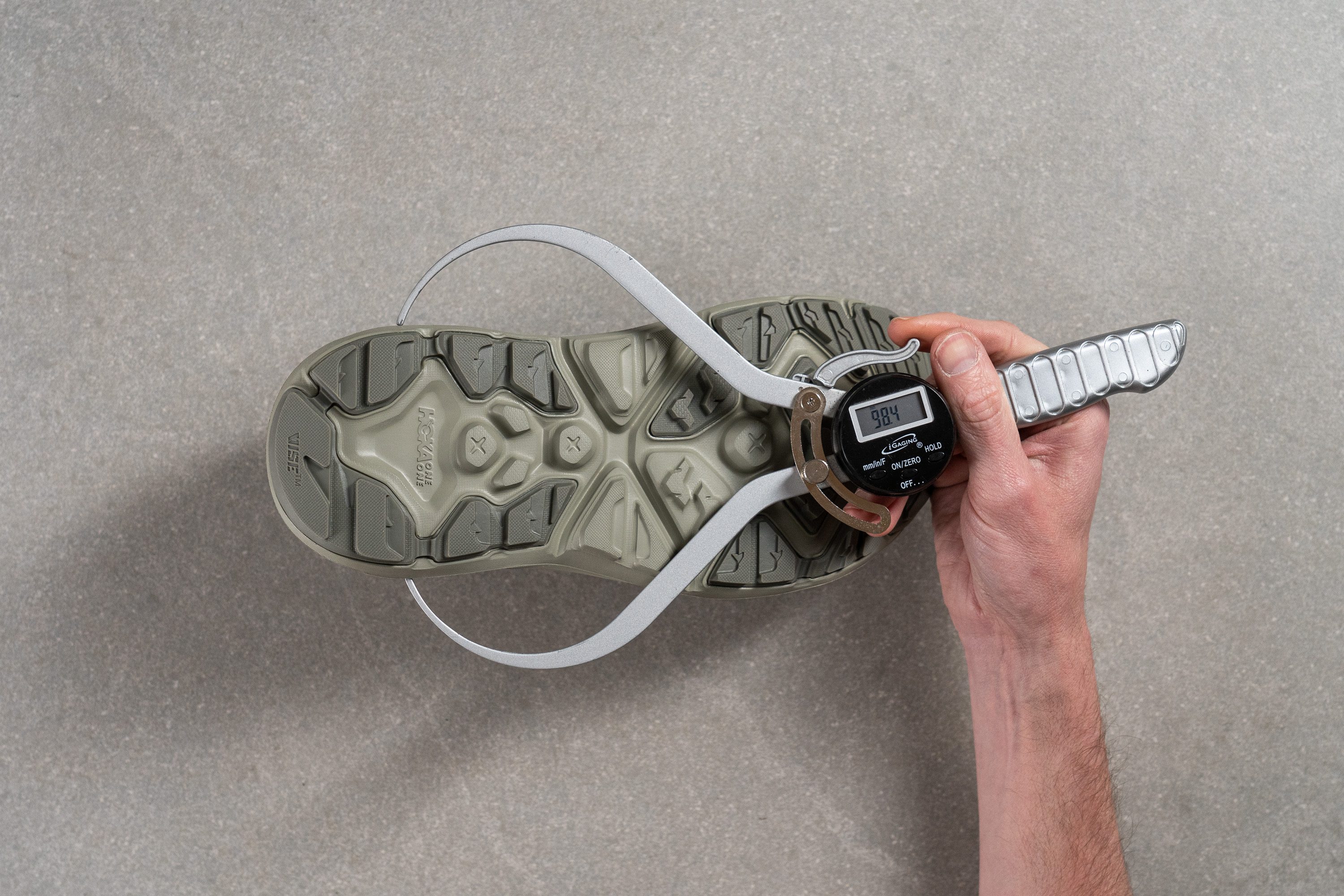
Showing 98.4 mm on our caliper, it is a solid 8 mm wider than the majority!
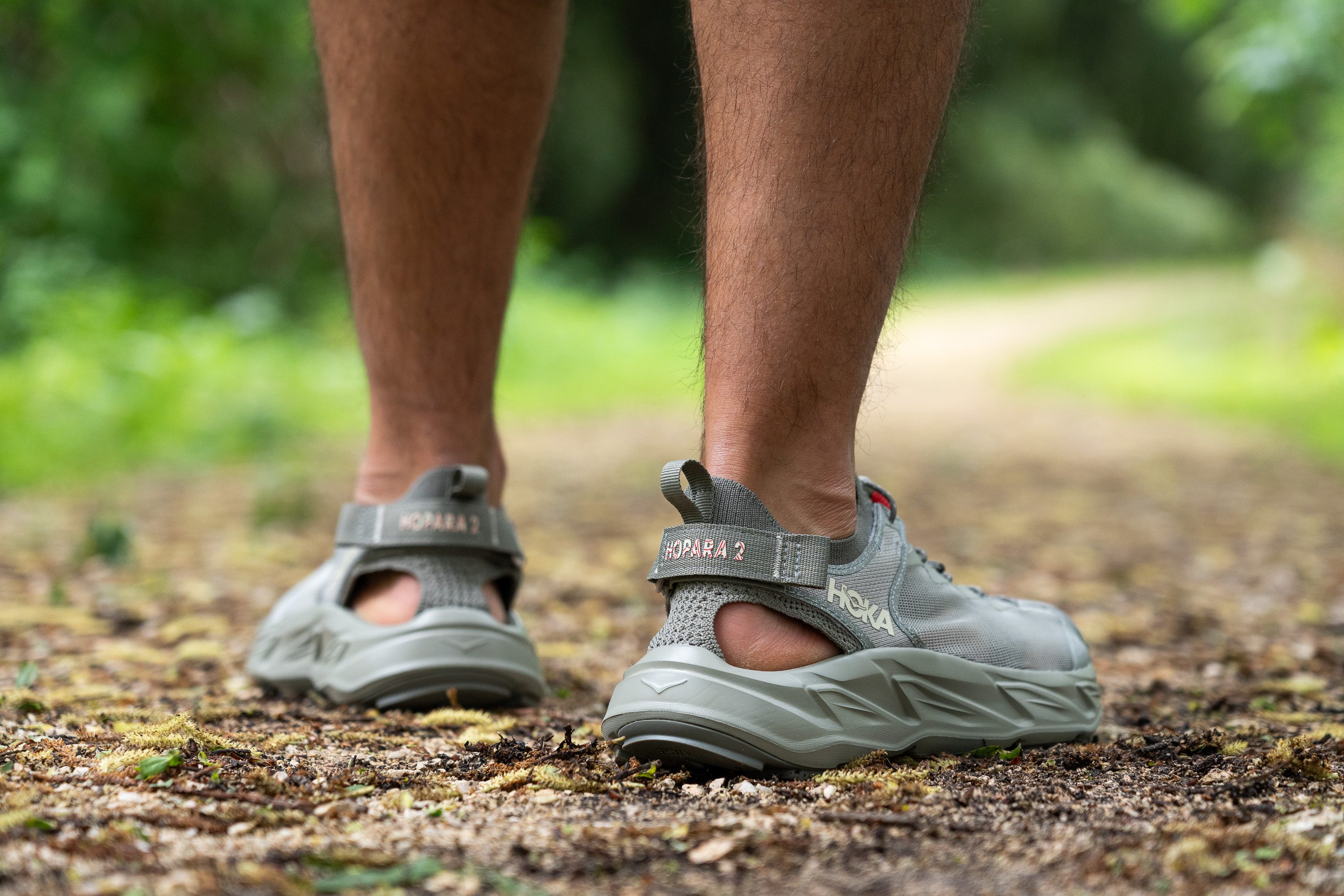
We thoroughly enjoyed this wide landing area as it helped us feel planted and steady on rocky and uneven surfaces.
| Hoka Hopara 2 | 98.4 mm |
| Average | 91.6 mm |
Durability
Toebox durability
The Hopara 2 inherited the oversized toe cap of the original sandal. It made us feel incredibly protected by softening the blow of the roots and rocks we stumbled upon.
To give you an idea of how sturdy this toe bumper is, we ruthlessly drilled it with sandpaper for 12 seconds. The speed of the Dremel was set to 5K RPM and the pressure remained consistent at 3.2N.
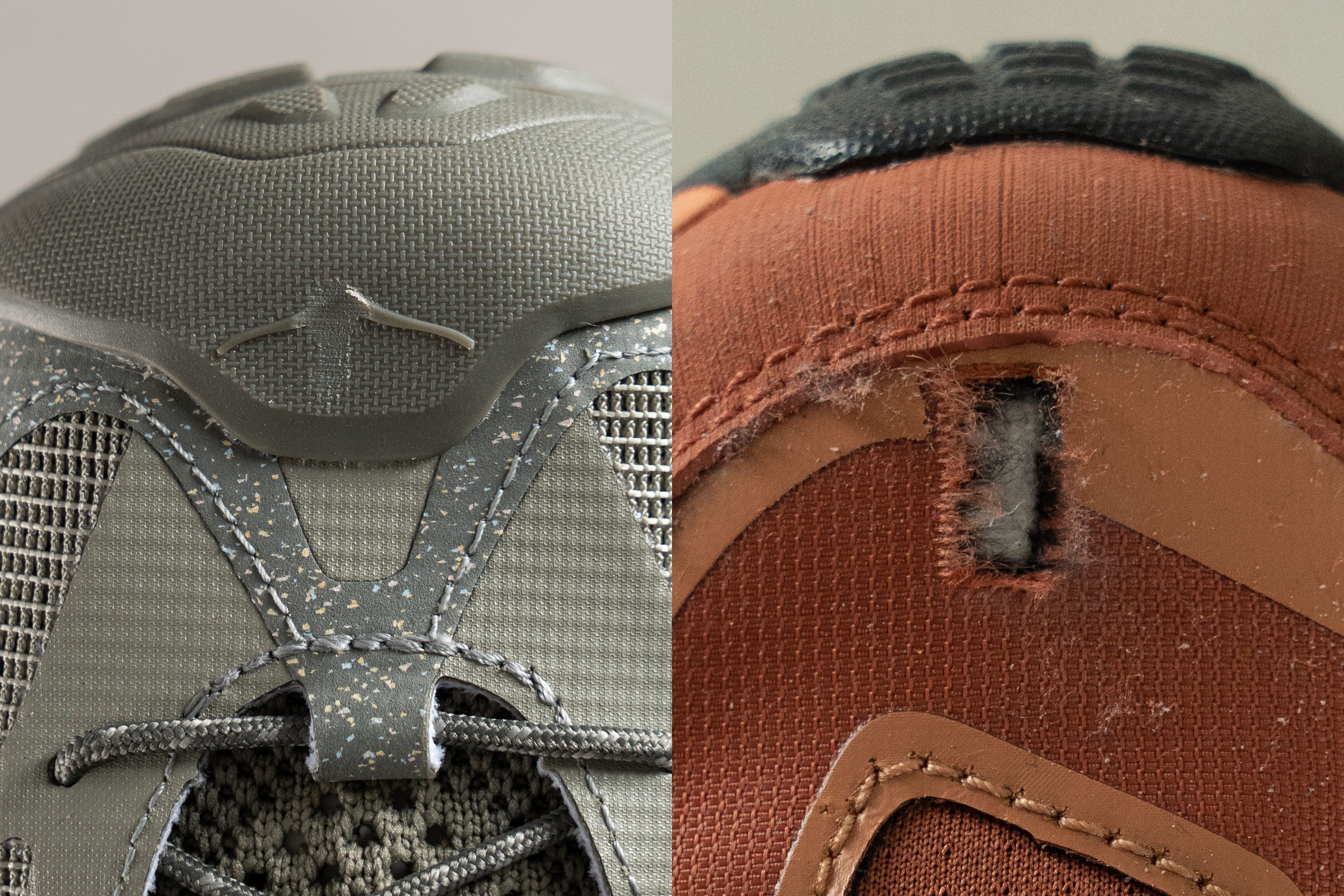
As you can see from the comparison photo above, the Hopara 2 sandal proved to be more ready for abrasion than some of the hiking shoes!
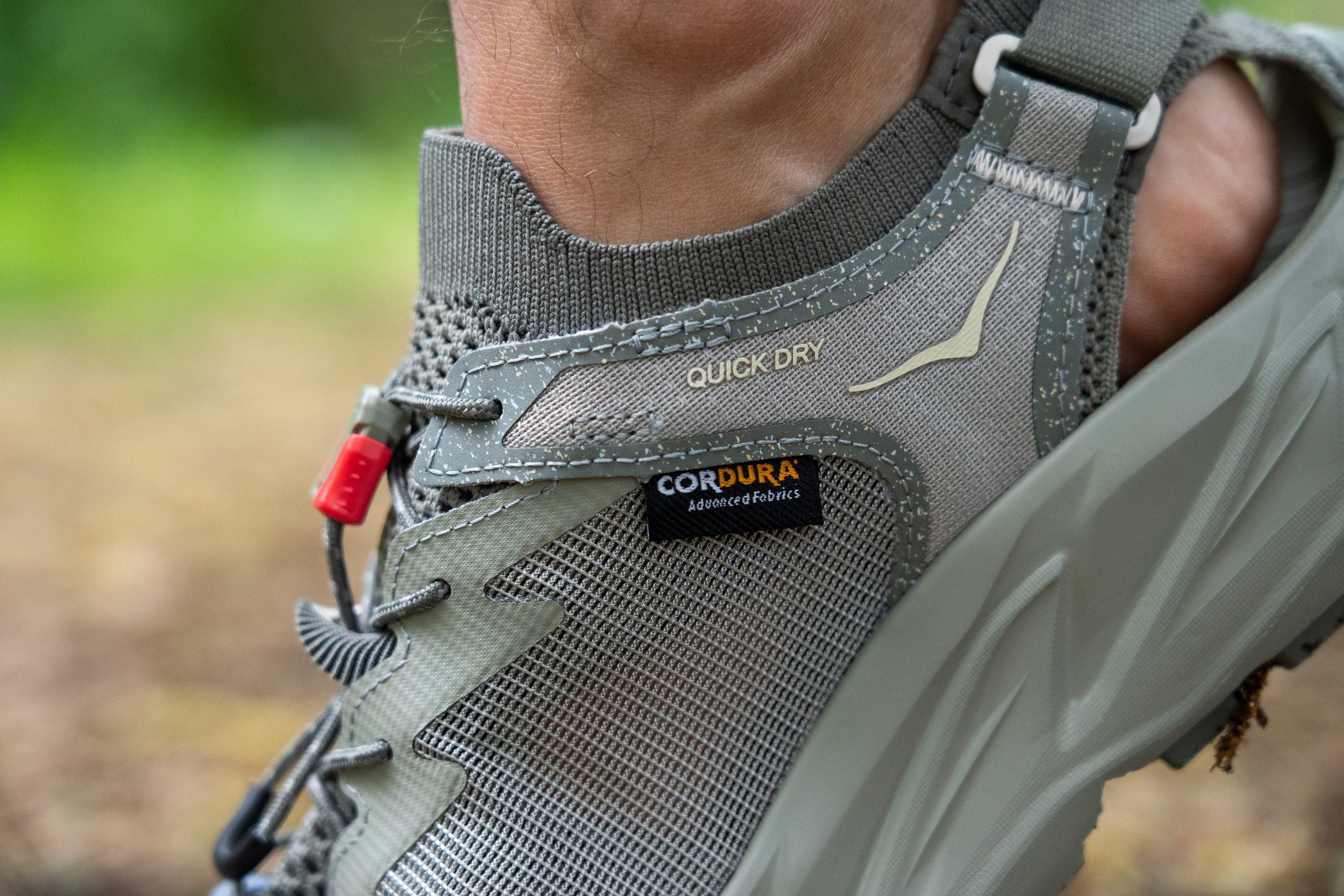
Even the less high-wear areas of the Hopara 2 are made of strong Cordura mesh panels. This synthetic fabric has a long-standing reputation in military and outdoor products and is known for its exceptional durability.
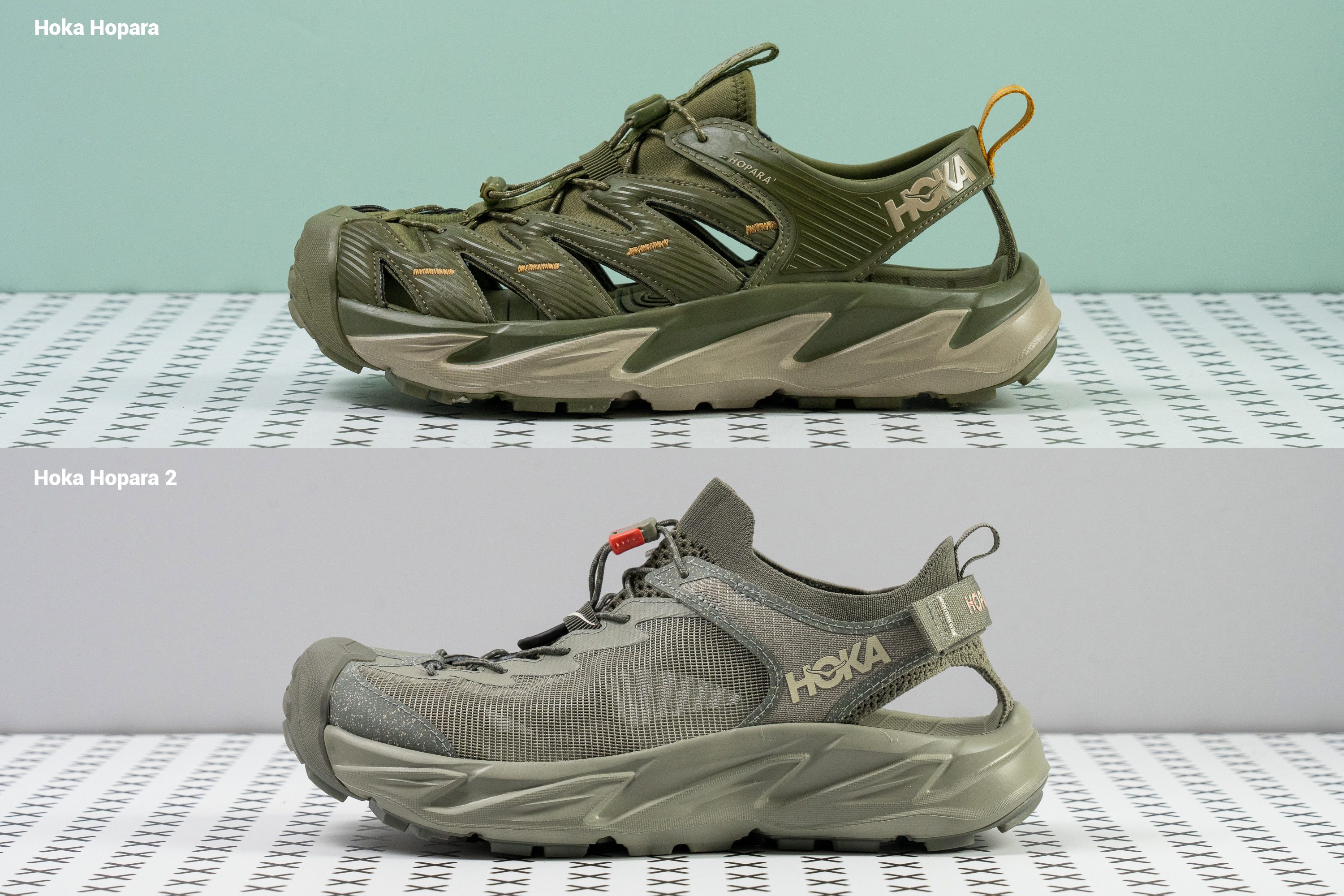
We found it a very wise upgrade from the thick and stuffy synthetic leather overlays of the Hopara 1. There are no more gaps to let pebbles and dirt inside the sandal and the Cordura mesh offers much better ventilation and water drainage.
Outsole hardness
The Hoka Hopara 2 uses targeted rubber to protect the most wear-prone areas of the sandal.
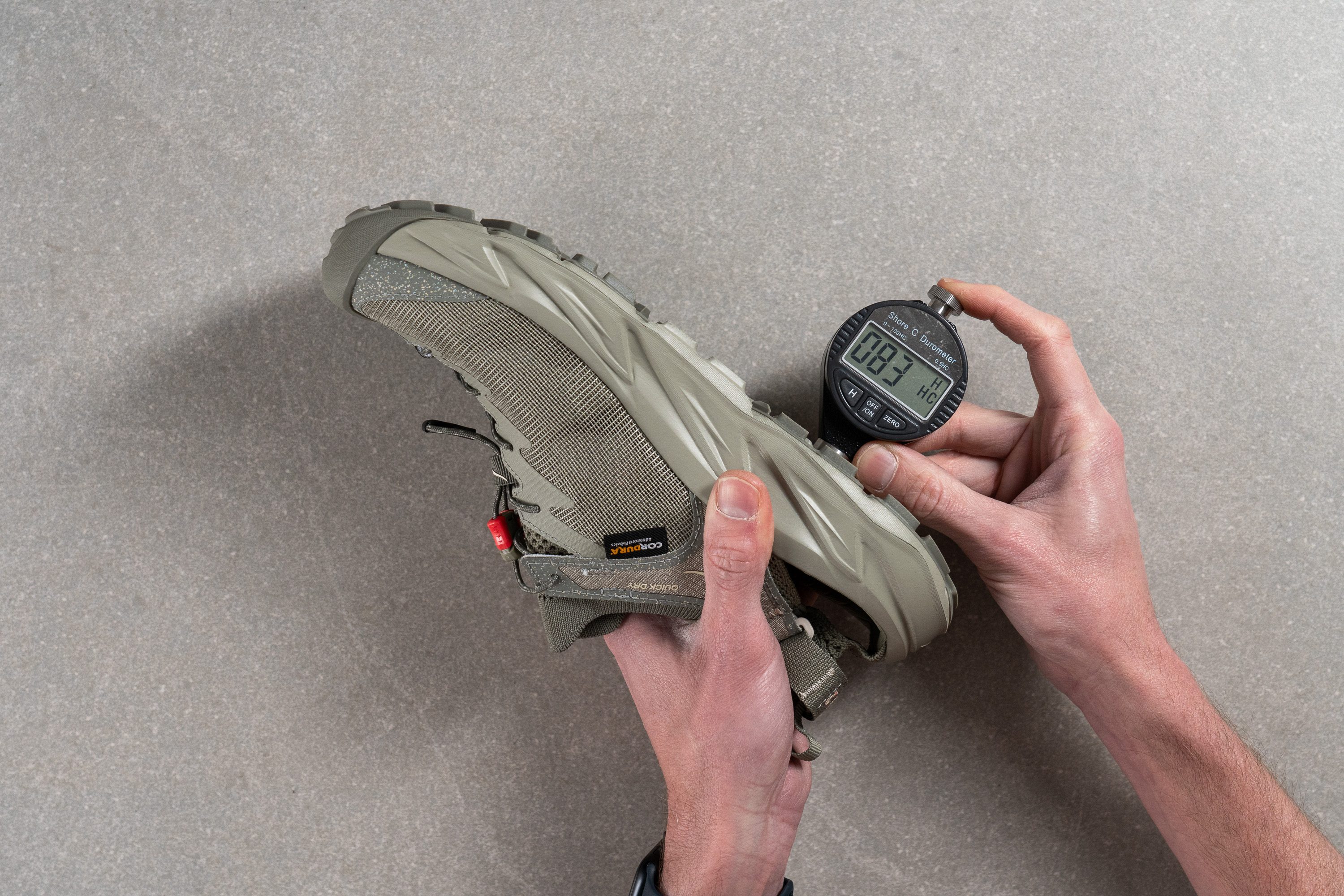
We found that this rubber compound is pretty tough using a Shore C durometer. At 82.9 HC, it is on par with most hiking sandals we've tested.
| Hoka Hopara 2 | 82.9 HC |
| Average | 80.5 HC |
Outsole durability
We turned to our Dremel once again to test if the sandal's rubber was indeed that heavy-duty.
After 22 seconds of drilling it at a high speed of 10K RPM, we only saw some light scuffing on the treading! Our tread gauge showed that it wasn't even a millimeter deep! Only 0.7 mm which is notably shallower than average.
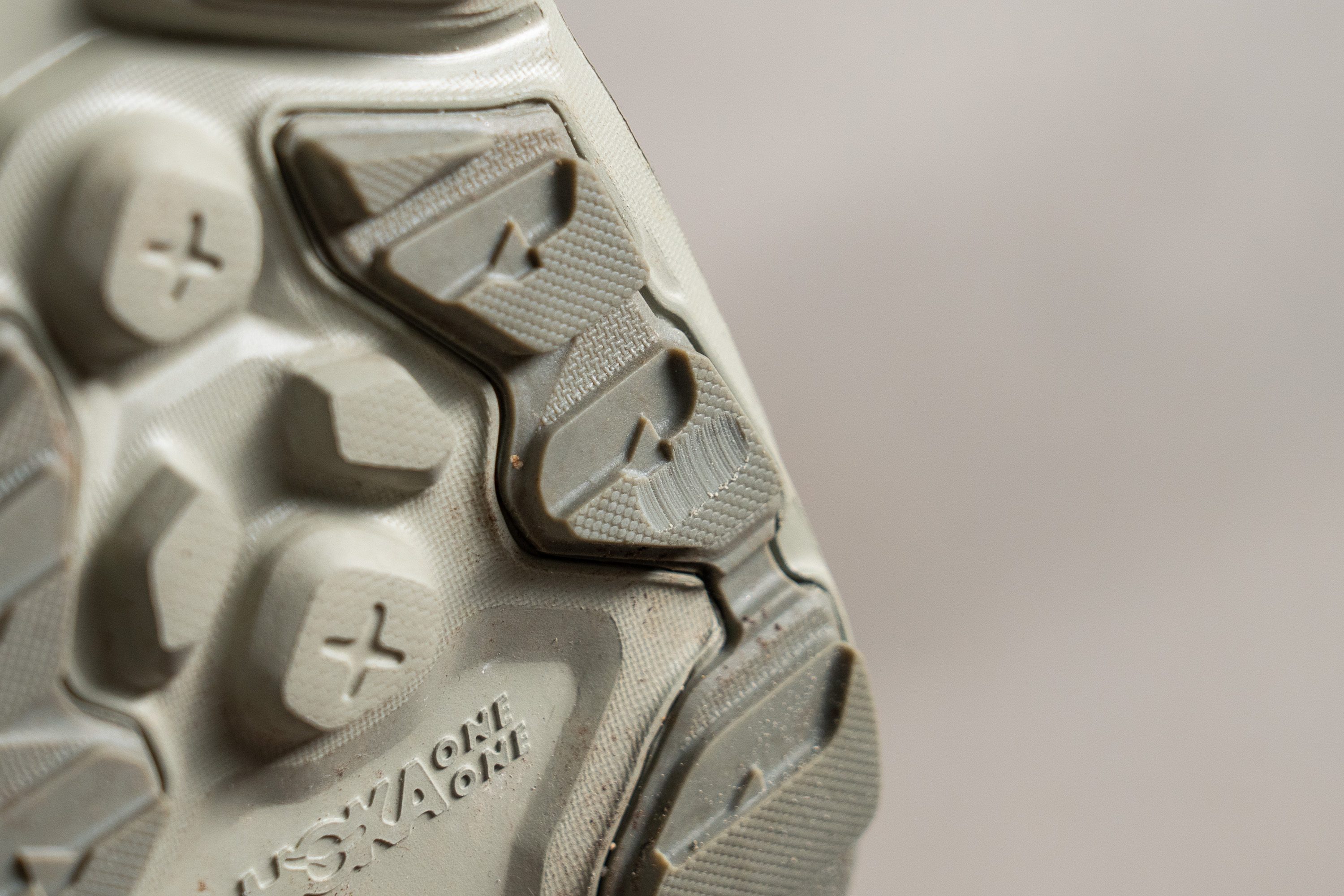
We anticipate that it would take a great deal of slashing the Hopara 2 against sharp rocks before its outsole rubber starts to give up.
| Hoka Hopara 2 | 0.7 mm |
| Average | 1.5 mm |
Outsole thickness
Measuring the amount of rubber at the bottom, our caliper showed a standard thickness of 2.7 mm. That's good enough for a hiking sandal.
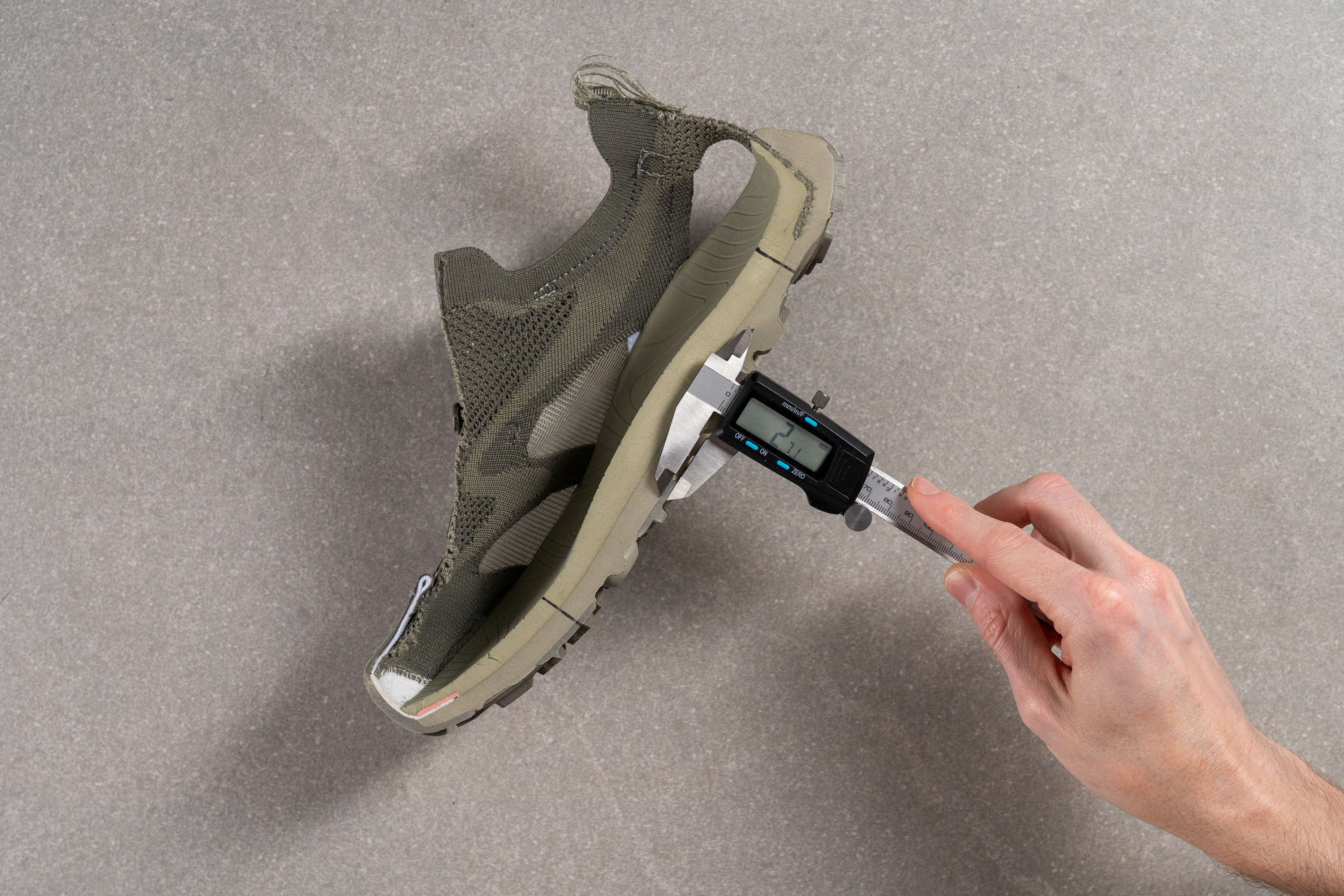
| Hoka Hopara 2 | 2.7 mm |
| Average | 2.5 mm |
Misc
Upper material thickness
The knit portion of the Hopara 2's upper is very thin. Measuring it on top of the instep returned a mere 2.3 mm.
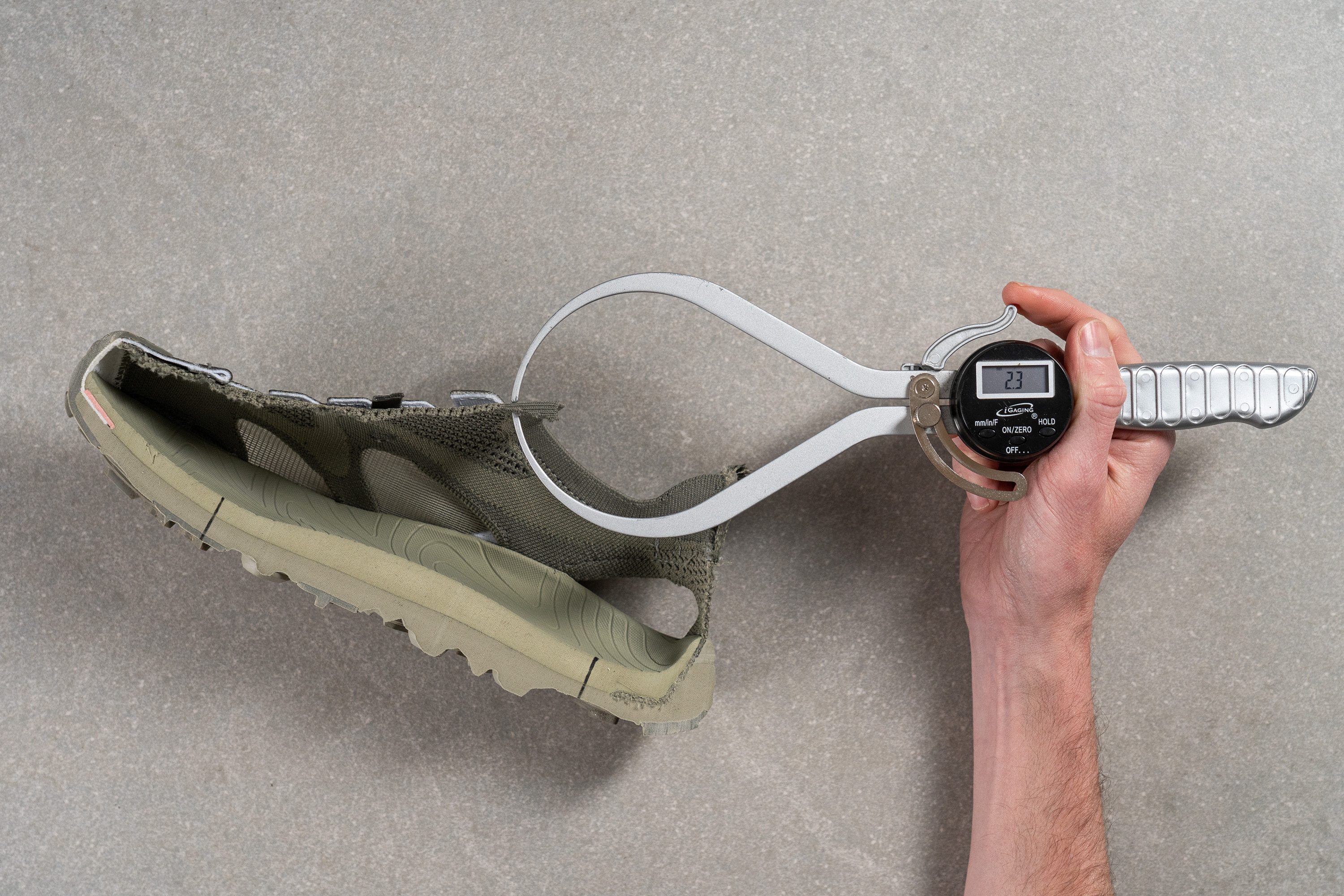
We are glad that Hoka kept the bulk only in the areas where it is most needed for protection.
| Hoka Hopara 2 | 2.3 mm |
| Average | 4.3 mm |
Heel tab
The finger loop at the back was pretty handy for shoving our foot inside the Hopara 2. It is a helpful feature considering the sock-like collar.
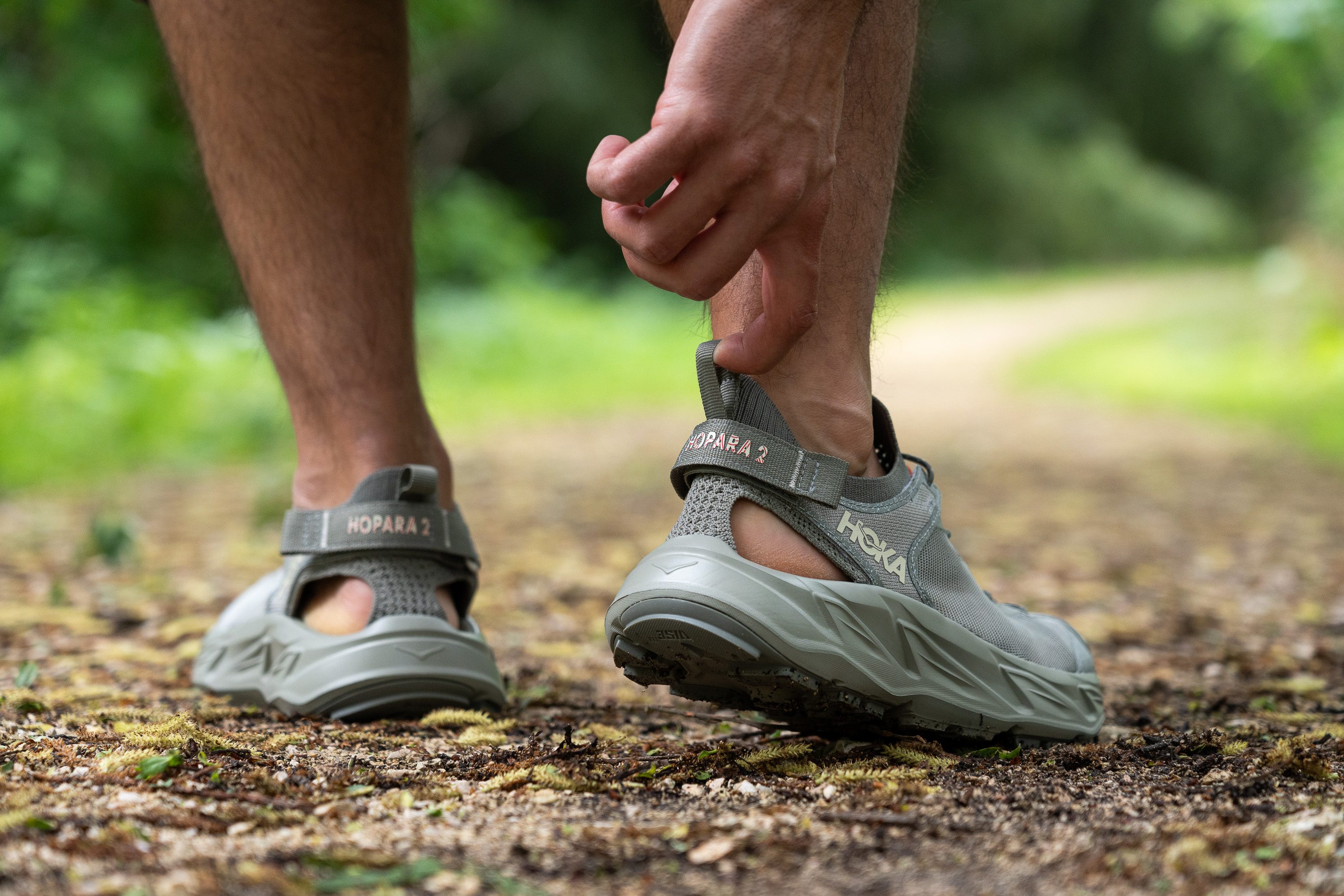
| Hoka Hopara 2 | Finger loop |
Sustainable materials
We discovered that Hoka includes ethically sourced materials in nearly every new pair.
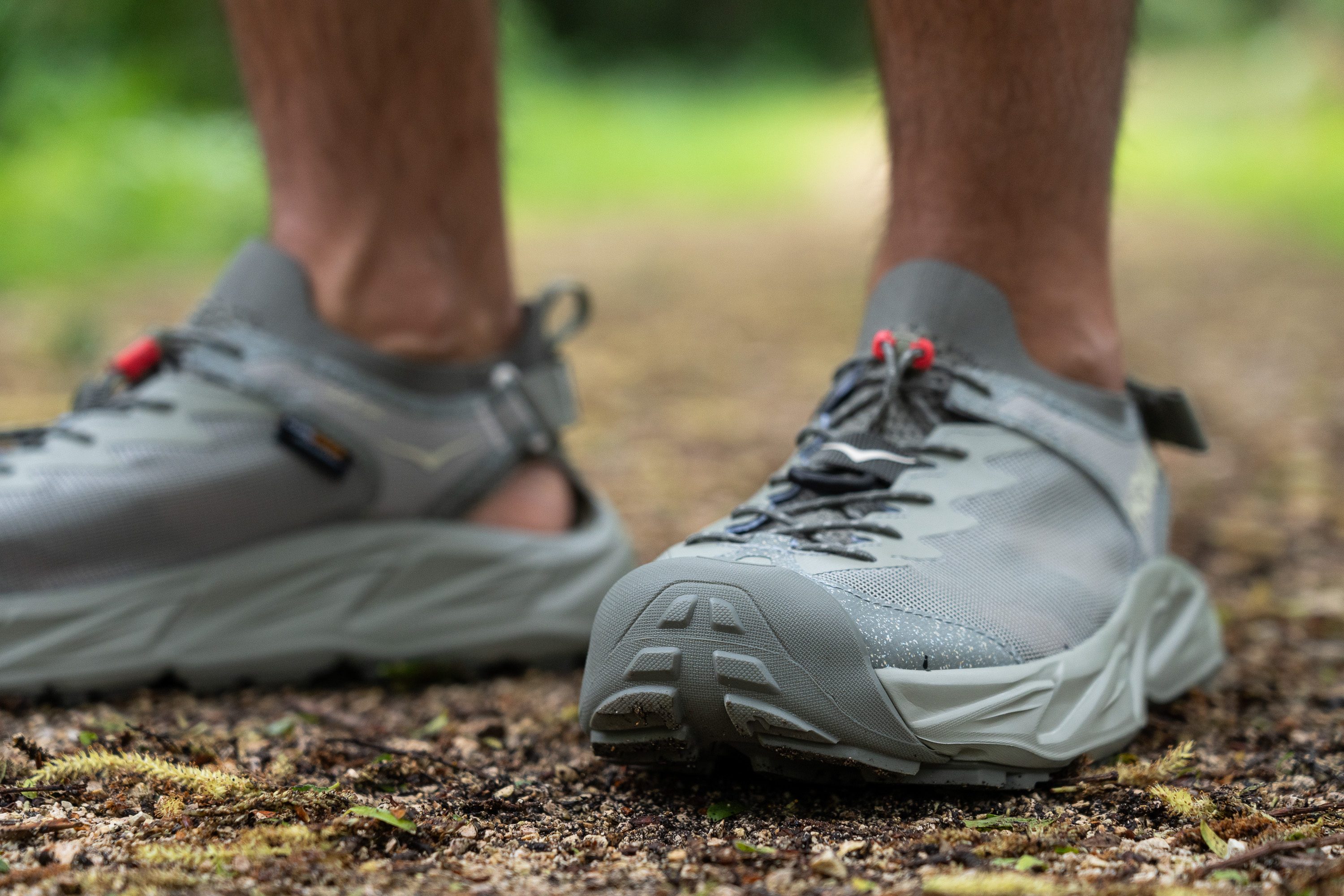
It's nice to know that the Hopara 2 helps you feel a little more in one with nature as it features the following components:
- 30% sugarcane topsole & midsole
- 100% recycled knit upper
- 100% recycled Cordura mesh
Color discrepancy
Please beware of the color mismatch between the Hopara 2's online photos and what the color actually looks like in person.
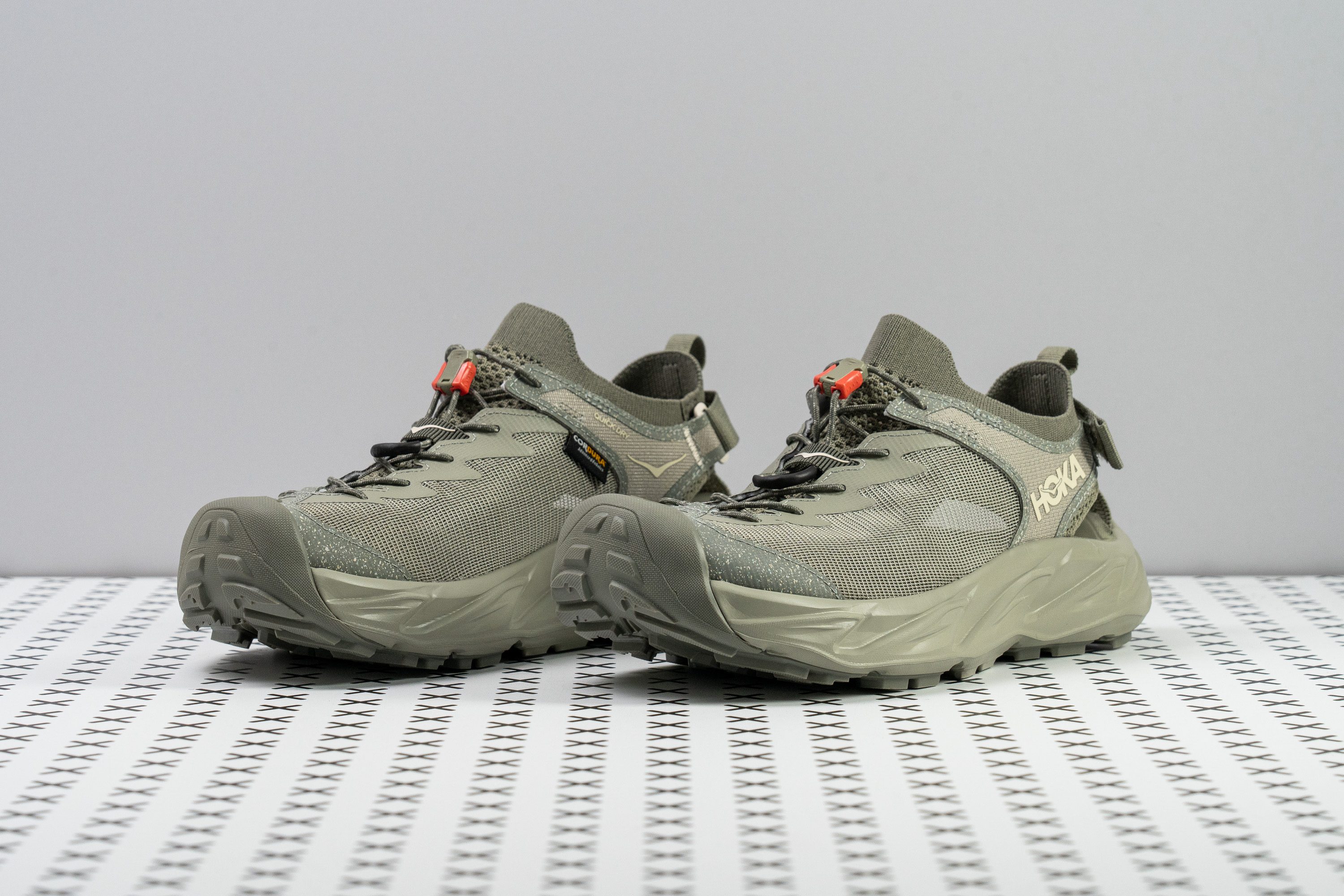
We can speak for the Barley/Oat milk colorway in particular. Even in our own photos, there is a discrepancy between studio and outdoor shots. Please keep in mind that the outdoor photos convey the hues more realistically.
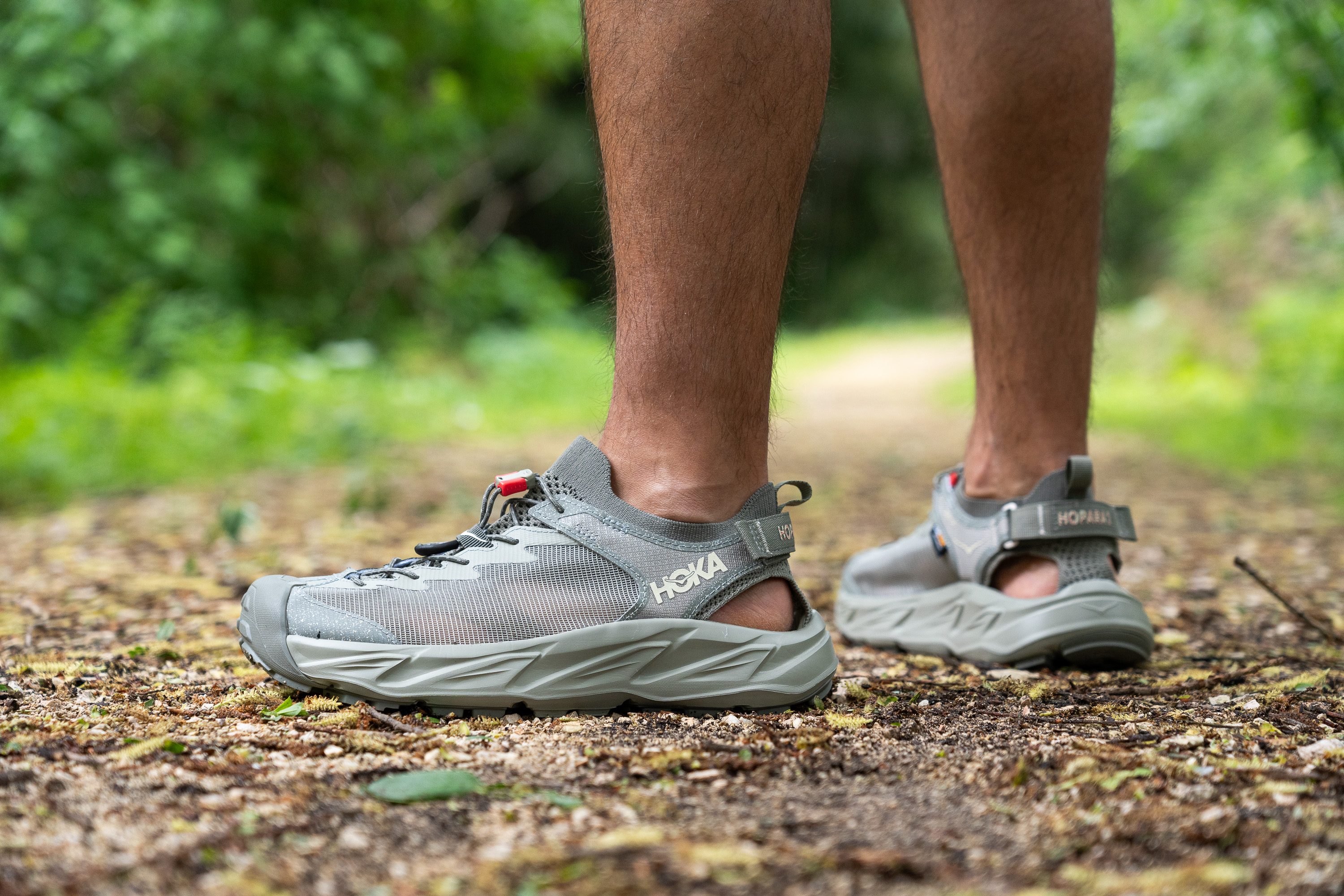
Water drainage
When it comes to water drainage, we believe that the Cordura mesh of the Hopara 2 is a better choice than thick synthetic overlays.
It helps the water escape from the sandal much quicker and doesn't let pebbles and dirt in as much as the v1 did.
The only problem is the sand. If you are looking for a beach sandal, the Hoka Hopara 2 is less than ideal for sinking into the sandy shores. It is practically impossible to get the stuck sand out of the sandal without taking it off and giving it a good rinse.
